#which manifested through her genocidal tendencies
Explore tagged Tumblr posts
Text
A Lesson From Owl House That Gets Overlooked
So, I don't know if you know this, but I used to have a tendency of bottling things up. I was scared of people being angry and upset with me, so I pushed everything way down and tried to not let things get to me. And the things I've been through are horrific at the kindest appraisal. I think you know why I'm bringing this up... So let's not waste time and just talk about the two most self-conscious characters in the series; Luz and Willow.

I don't know if you noticed this through the series, but Luz internalizes EVERYTHING. Even before Hollow Mind and the whole "I accidentally helped a genocidal maniac carry out his wicked plan" thing, Luz was quietly baring the burden of grief and trauma. We don't know the full scope of the bullying she endured, it was probably hellish and certainly isolated her. Not only that, but she was carrying the pain of losing her father, which she also internalized.
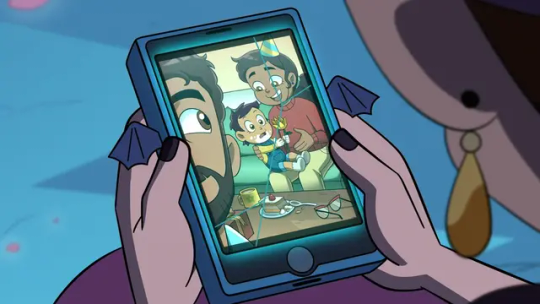
Because of this, along with the bullying and the lack of support from adults in her life (save for Camila,) Luz doesn't really have a great support system until she meets Eda and King. And even then, it took Willow, Gus, and especially Amity for her to really open up about things.
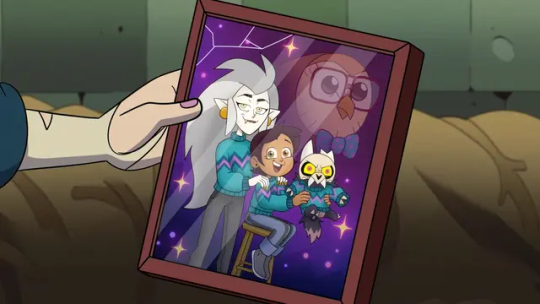
Meanwhile, Willow was browbeaten by virtually everyone in her life. Amity, Boscha, teachers, everyone looked down on her, calling her 'Half-a-Witch,' forced into learning Abomination magic by her dads instead of the Plant magic she excels at. And of course, instead of that pain manifesting as grief and misery, Willow's internalization of her emotions turns to anger, frustration, and self-loathing as we see the first time we meet her.
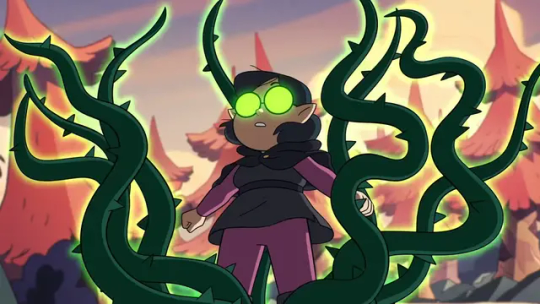
Of course, she befriends Gus and Luz and things start to get better, but they depend on her strength and wisdom too much, which allows her to mask her feelings in favor of helping and supporting her friends. We see that it doesn't help that much, especially after Amity once again hurts her by accidentally burning all of her memories.
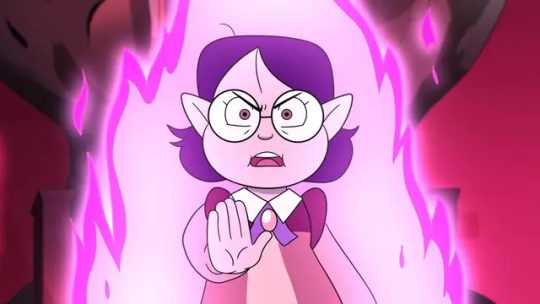
Granted, things worked out between them, but Amity (subconsciously, as she was genuinely concerned and cared about Willow) was looking down on her much later. And yes, Willow gets to be in the Plant track and becomes the Flier Derby captain of her dreams. However she's still hard on herself, still keeping herself from letting things out... Oh, did you guys not notice that in For the Future? Because Boscha was egging her on and antagonizing her in a moment of weakness, Willow was going to probably hurt or even kill her bully out of sheer anger.

Yeah, if that scene played out any further and she wasn't rendered unconscious by sleeping nettles, Willow was going to do something incredibly bad. I think Elijah (not-so-average-fangirl) saw that too, which is why she said "Willow, are you ok?" during that scene. I know from personal experience that Willow was at her absolute breaking point and when you realize that, it's terrifying. She was going to let out her anger violently on someone who deserved it, but not to the extent that she was clearly going to go with it. It's also why Willow does indeed breakdown after that. She can no longer control her emotions, especially after seeing her dad puppeted and the guy she clearly had feelings for die in her arms...

Of course, we know how both Luz's breakdown in Reaching Out and Willow's breakdown in For the Future resolve. They both talk about it or let out their emotions, and they do so in front of the people that matter the most to them.
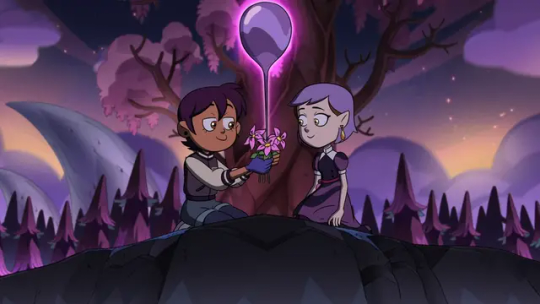
For Luz, she tells Amity about her dad. She cries over it in front of her and they resolve their first real fight since going out. Then, they both make flowers and cast them off over the Boiling Sea, continuing the tradition of Luz and her mom without being in the Human Realm. Amity's also the one that tries to comfort Luz the most after learning about Belos, because even if our hero isn't feeling great about what happened, she still someone who truly loves and supports her.
For Willow, it was a need for someone who doesn't rely on her telling her that it was ok to let it out. Someone who could stop her and beg her to never call herself 'Half-a-Witch' again. Someone who truly understood all the pain she was going through and was willing to both support her and let her vent. Now who could that be...?

Of course, Gus did obviously help in that scene, but Willow needed to hear it from Hunter. She needed someone who has only ever seen her as strong who didn't depend on her for support to just say 'you've been holding in a lot, haven't you?' Granted, I won't say you need romantic love to let your feelings and pain out to, but I am saying that a strong enough and supportive enough person can help with that. That's why Gus being there in the Willow breakdown was important. That's why all of Luz's friends telling her that helping Belos wasn't her fault was important. The most important thing about bottling emotions is to have someone there to talk to, be it friend, family, lover, or therapist.
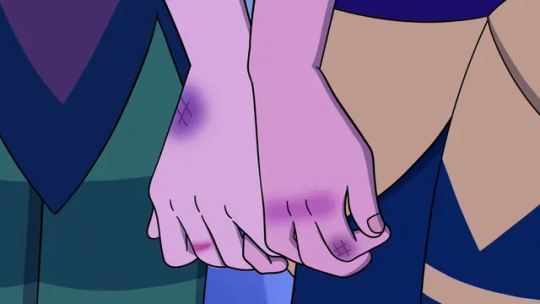

58 notes
·
View notes
Text
The Perfect Closure of EreMika
The title is pure clickbait (as always), there will be lots of tags (as always) and this post will be huge. As always. So, let’s examine and evaluate the perfect conclusion of the most important relationship in Attack on Titan. We will analyze why this is the best conclusion they could have gotten and of course we are going to talk about what their scenes meant for their relationship, their feelings for each other and the themes of the story.
First, let’s ask the question: What was the purpose of this chapter? Ending the fight obviously, but also giving closure to the relationship between Eren and Mikasa. Now, there were 3 questions that needed to be answered in order for the two of them to have closure.
Why did Eren say to Mikasa that he hated her?
What does Eren feel for Mikasa?
What would have happened if Mikasa had given Eren a different answer back in chapter 123?
Isayama answered all 3 of them in a spectacular way. Let’s see how he did it. The chapter literally starts with Isayama, via Mikasa, setting up the closure. This was achieved by having her wonder if this really was the end for her and Eren. Could it be that their last interaction ever ended with him saying that he hated her?
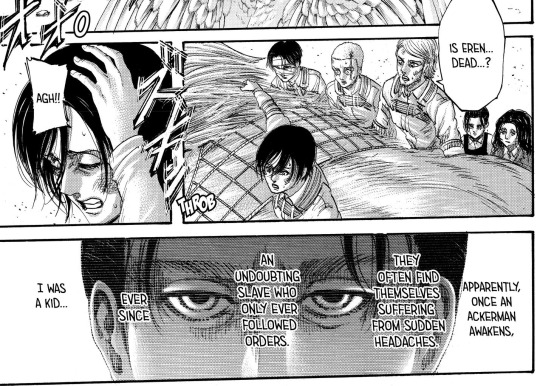
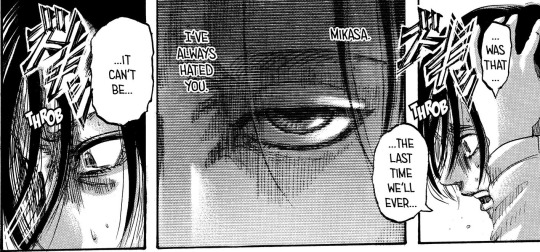
Isayama answers that with a big, fat NO.
That’s the purpose of Mikasa’s vision. Mikasa’s vision is not there to introduce us to Alternate Universes or to portray her as a delusional fangirl that can’t cope with reality. It’s purpose is to answer the above 3 questions. And that it does.
Essentially, Mikasa’s vision is a “What if” scenario. If Mikasa had chosen the ideal for her answer back in chapter 123, Eren would have abandoned everything and lived with her. This means that Eren is also in love with her. He said that he hated Mikasa, because he wanted her to forget him. That’s why he also asked her to throw away the scarf.
Mikasa though, being the truest representation of all major, positive themes in the series says no. She chooses to remember him. That’s essentially the meaning of life. That’s what Armin taught to Zeke back in chapter 137. Memories of everyday life. That’s the meaning of life. Back in Trost, Mikasa said that she couldn’t die, because she wouldn’t be able to remember Eren. Even back then, Mikasa always knew the true meaning of life.
Afterall, the series heavily criticizes the usage of memory manipulation. Deleting memories or altering them have been methods empoyed by the Royal Family for years, hiding the truth from the people. One of the themes of the Survey Corps is remembering their fallen comrades and carrying on the torch. Mikasa forgetting Eren would be an insult to the themes of the story. As would be if Eren was revealed to have been sending fake memories and dreams to Mikasa out of pity for her.
Finally, Mikasa decides to kill Eren. Not because he hated her or because he didn’t have romantic feelings for her. Because she had to save the world and because that’s exactly what Eren wanted. Back in chapter 133 Reiner foreshadowed Eren’s desires. He explained that it is very hard for Eren, mentally, to handle the murder of the entire human race. Through Reiner, Isayama reveals that Eren wants someone to end it all for him. That someone was Mikasa. That’s why Mikasa knew where to find Eren. His relieved face when he saw her swinging the blade said it all. That was Eren’s design and Mikasa delivered.
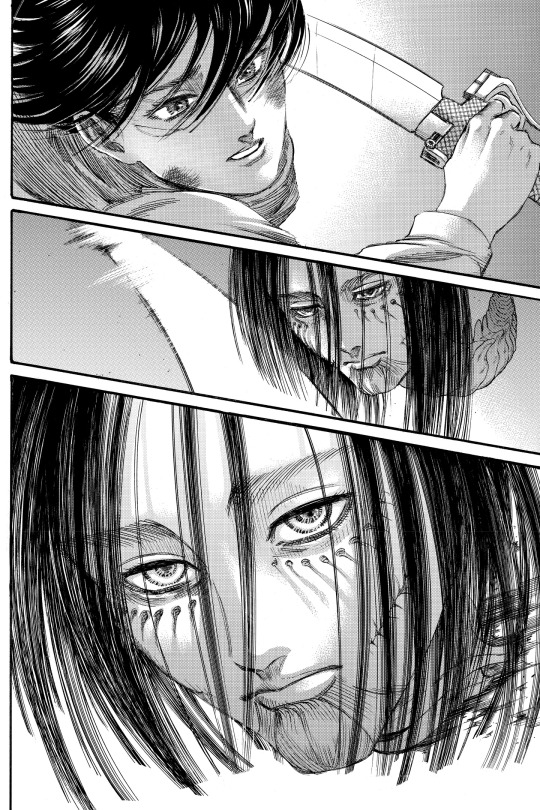
And so, the chapter that starts with Mikasa thinking that the only closure she would get with Eren was the “I’ve always hated you”, ends with the first and the last kiss between the two of them that puts all of her worries to rest.
Is Mikasa delusional?
I’ve seen this being thrown around, so i have to also tackle said point. No, Mikasa is not delusional. This wasn’t a fantasy that only she experienced. This dream of hers is the same dream that Eren had back in chapter 1. Eren experienced the exact same things she did in the dream. We even see him with his titan marks. It is clear as day that they shared these moments.
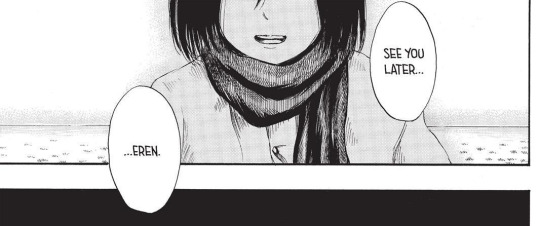
Also, i have to give credits to Isayama here for his usage of “itterasshai”. The word generally means “Go and come back safely” and is usually said to people leaving the house. For Mikasa, Eren is her home, but she is also home for him, as shown in the RtS arc:

These were the perfect parting words for the two of them. Nothing else could encapsulate their relationship better. Eren of course, won’t come back, but that’s the irony of the word here.
Moving on to the next point, Mikasa’s characterization in this final arc is about her seeing Eren for the person he truly is and stop ignoring his faults. It starts from the Marley arc and it concludes with chapter 123 where she realizes that this was simply part of Eren’s nature.
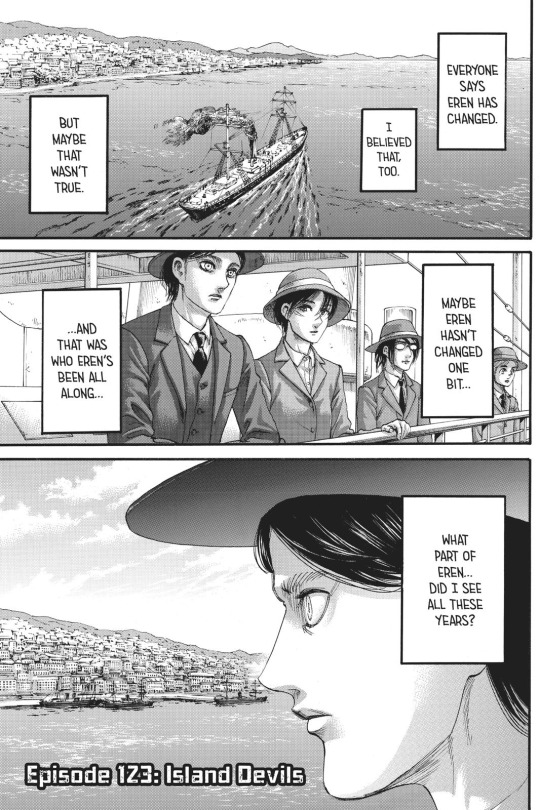
He always had it in him to become the monster that he became. However, he always had a different side to him. A side that had been shown to her a few times. At first, when he wrapped the scarf around her and later when he asked her “What am i to you”. Finally, it manifested as a desire to live quietly with her in their shared dream. It would contradict her development and characterization in the final arc, to have Mikasa start seeing an incomplete Eren again, after realizing earlier who he really was. Mikasa understood who Eren truly is and she accepted him and continued to love him anyway, even though she didn’t agree with his genocide.
It is not out of character for Eren to run away with her either. At least not in that instance. The series highlights the moment that he asked Mikasa “What am i to you” as a pivotal one. Sure, under normal circumstances, Eren would have chosen to fight, but we saw him breaking down just moments earlier. The only person that could have saved him was Mikasa. Alas, that wasn’t meant to happen.
In any instance, the biggest indicator that Mikasa is not just a delusional girl who kissed the decapitated head of the man she loved, when he never really loved her in the same way, is Ymir’s face at the end of the chapter.
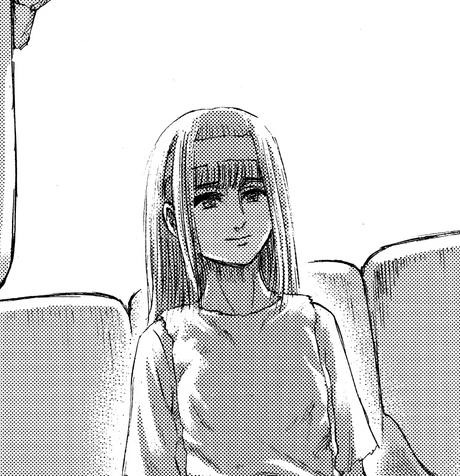
Ymir, as i have mentioned in previous posts, is a girl who never knew real love during her lifetime. She didn’t understand what she was looking at, when she first say a couple kissing with their friends cheering them on. And after that she was sentenced to a cruel life, with a man who never loved her and only viewed her as a tool. This girl, remembers longinly that scene of the couple kissing for 2000 years. She was waiting for 2000 years to see real love again.
She witnessed that through Eren and Mikasa. In a scene that would have otherwise been painted in a negative light, Ymir’s warm smile at the sight of the final act of love between two people who never got to be together the way they wanted to, clears any and all doubts regarding Eren’s feelings for Mikasa and the latter’s sanity. Eren reciprocates Mikasa’s feelings and he was alive for enough time to kiss her back, before completely fading away. Eren and Mikasa replaced the married couple and Ymir replaced the crowd that was cheering at them from 2000 years ago.
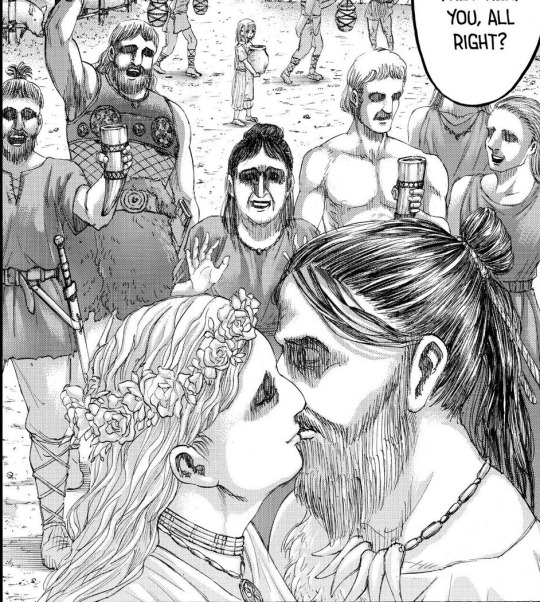
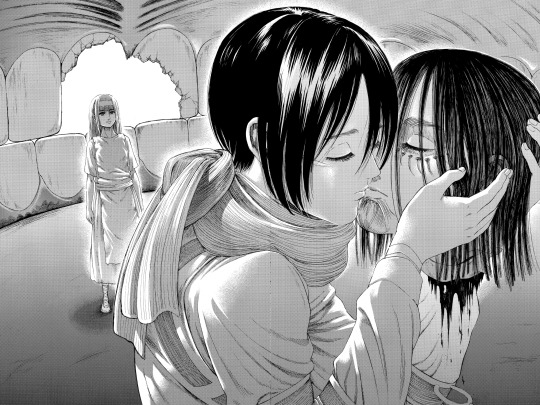
Of course, one might ask, could Eren really kiss her? Didn’t she just take advantage of him? No, he did kiss her. The way the scene was directed, it shows us that the events, which take place in their dream, mirror the events in real life. Just look at Eren’s lips one moment before Mikasa kissed him and compare them to the picture above, where they kiss. They are different.
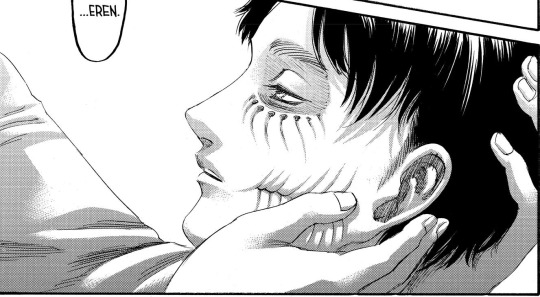
Also, you have to remeber that decapitation doesn’t kill immediately and does not immobilize facial muscles. That was the entire reason that Eren and Zeke managed to get the Coordinate. Eren survived long enough from Gabi’s shot to make contact with Zeke. Even his facial expression changes as you can see below:
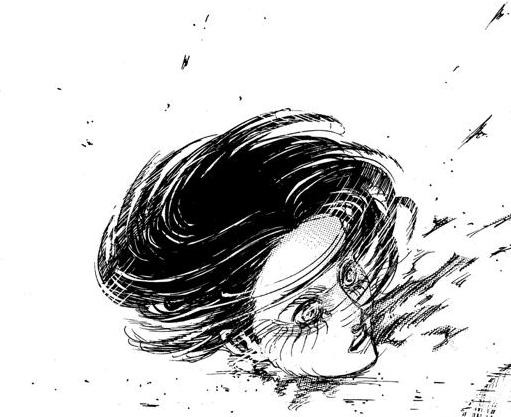
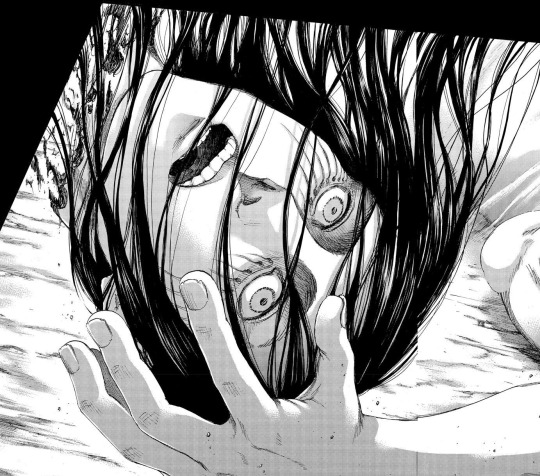
More importantly, was there really any chance that Ymir would look at Mikasa beheading and kissing Eren, while also smiling in approval, if Mikasa was a delusional girl who was unable to understand Eren’s feelings for her up to the very end? Most of all, do you think she would have allowed him to die, without experiencing real love? She died in such a way and she stayed for 2000 years in the Paths waiting for someone to show her real love. Eren was her benefactor. Would she ever allow him to die in such a way, when she was being mistreated (sexually and in many other ways) by King Fritz? I doubt it. Actually no. I don’t doubt it. I’m sure this is not the way we are meant to interprete the scene.
Eren’s relationship with Mikasa, from the very start, is an allegory for the world of AoT. The world is cruel, but is also very beautiful. Eren’s story with Mikasa starts with him murdering in cold blood her kidnappers (cruelty) and then warmly and gently welcoming her to his family by wrapping a scarf around her (beauty). Their story ends with Mikasa decapitating him (cruelty) and kissing him (beauty).
Eren’s tendency for violence has always been portrayed as going hand in hand with his better side. That side has always been represented by Mikasa. It is only fitting for them to have their most beautiful moment happening almost at the same time as their most cruel one. This is how Isayama juxtaposes this duality:
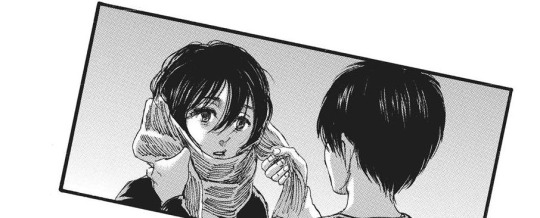
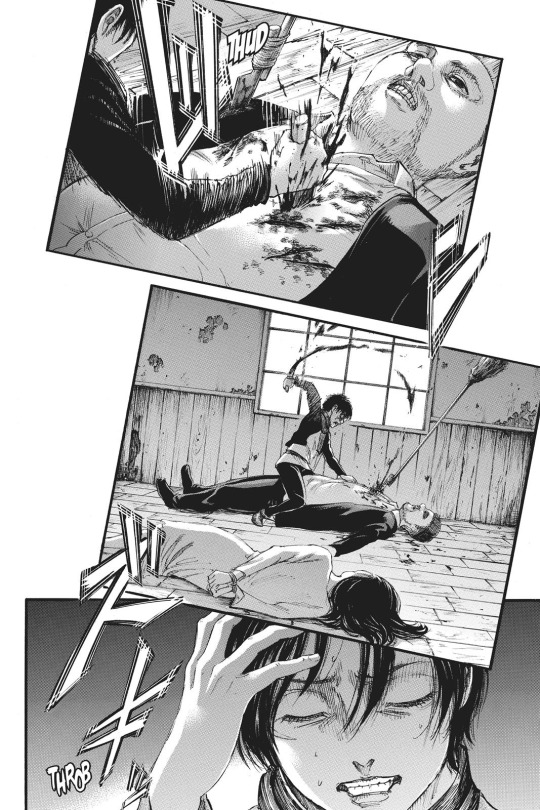
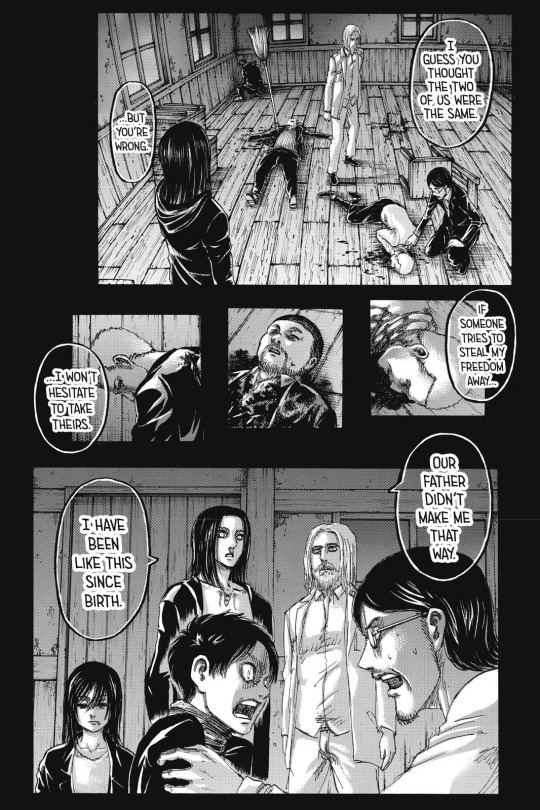
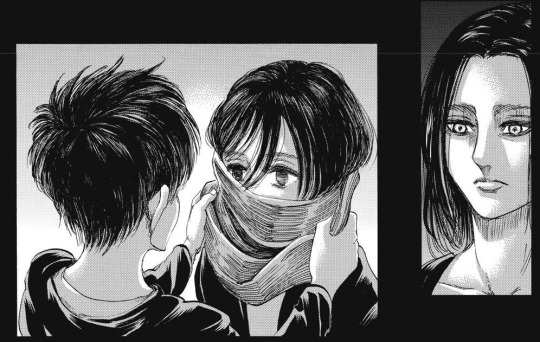
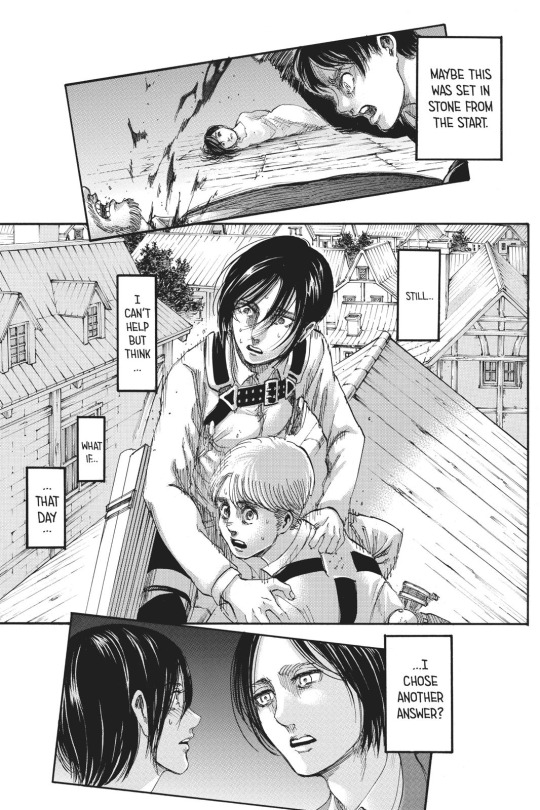
If we interprete this scene as Mikasa being delusional and Eren not being in love with her we get a very disturbing and creepy scene, between an obsessed, psychosis-suffering girl who can’t understand the feelings of Eren, a genocidal maniac who never had any chance or willingness to live a normal life, even though there are hints of that, and a 2000 year old ghost who just happily smiled at the decapitation and forceful kissing of her emancipator. I am pretty sure this is not the message Isayama wants to send. Not simply, because it is a disservice to Mikasa as a character and to her relationship with Eren, which has been one of the most prominent and consistent part of the series from the very first chapter, but because it is also a huge disrespect to Eren as a character as well. Does anyone really think that Isayama would choose to write Eren’s death like that? Not a single important person in the entire story has gotten such an exit. Not even Floch. Even Zeke, who thought that his father never loved him and only used him as a tool, got to see that his father truly did love him, before finally dying. Of course Eren and Mikasa would get the same treatment.
What i mean to say is that Eren and Mikasa’s closure won’t be recontextualized in a way that will paint their feelings for one another and their relationship in a negative light. If anyone’s expecting that, he/she will be disappointed. Eren and Mikasa were confirmed as a canonical couple in chapter 138.
On the other hand, if anyone’s expecting that this wasn’t their real closure and that they will get an even happier ending, he/she is also coping hard. Eren died here in this chapter. There won’t be a scarf rewrap (i’m here to eat my words if it happens), because Isayama gave the couple a kiss. A kiss that was in the makings ever since chapter 50 dropped. And of course, there is not going to be a baby born to Eren and Mikasa. Like, no way it’s happening. Eren is not coming back to life as that would turnish the series and it’s ending.
In conclusion, Eren’s relationship with Mikasa ended in the same way it started. Violently and Beautifully. Tragically and Happily. They acted on their romantic feelings for each other the very moment they had to part ways forever. This is how Isayama hurts us. The essence of a bittersweet conclusion.
EDIT: EATING MY WORDS AS PROMISED. EREN DID REWRAP MIKASA’S SCARF. HE KEPT HIS PROMISE.
#attack on titan#AoT#aot meta#aot 138#aot spoilers#aot theory#shingeki no kyojin#SnK Spoilers#snk theory#SNK analysis#snk meta#snk 138#ymir#shingeki no kyojin ymir#eren yeager#eren#eremika#Mikasa#Mikasa Ackerman#zeke#zeke yeager#floch#kiss#canon#eren x mikasa
2K notes
·
View notes
Text

Resigned To Fate
Prompt: Memory Alteration / Gaslighting
Relationships: Guxart/Vesemir (from one of the witcher-centric cards), Lambert/Aiden (background)
Rating: M
Content Warnings: heavy angst, suicidal tendencies, grief, mild gore, self-harm allusions
Summary: In the aftermath of the betrayal of the Cat school, Vesemir has not only his own school to hold together, but also a traumatised lover to care for. In which: Vesemir is strong and Guxart is weak and they find it hard to meet in the middle.
Word Count: ~2k
@witcher-rarepair-summer-bingo
I.
Witchers survive.
Witchers endure.
Witchers outlast.
No matter the tragedy that befalls them or how difficult the contract. When they're being persecuted and beaten, starved and denied basic human decency. There's always a way forward.
Survive. Endure. Outlast.
Those are the thoughts Vesemir clings to, each sentiment falling as a whisper from his cracked and splintered lips to puddle at his blood- and gut-soaked feet, each word accompanied by the low wheeze of his shovel penetrating dry earth.
He couldn't fight for them, has to bury them. All of them.
He doesn't cry like the pups do, they haven't yet understood.
This is no genocide. This is merely a manifestation of what has been a long time coming, a natural course of history.
Vesemir cradles that truth tight to his chest. He survives, endures, outlasts. It's his birthright, duty, privilege, honour, burden, curse, cure, calling, punishment. It's a law of nature, the first one the new recruits learn when coming to the keep.
Nothing breaks Vesemir.
II.
When the wolves all sleep, the living in bed rolls pushed together in the great hall, the dead in their forever resting places of hard-packed dirt, the new day is already sloshing over the horizon in waves of muted scarlet. Vesemir finds no beauty in that, he doesn't think he will find any beauty in and around Kaer Morhen ever again. All that was tranquil about this place has been soaked in blood and so, it seems, has the sky. He fills a pack with their sorry dinner's leftovers - stale bread, hard cheese, dried berries - foregoes the soup and the spirits. Two deerskins of water and a faded quilt blanket. It smells like cinnamon and honey, like comfort he hopes. It's not cold enough to warrant any kind of coat yet, but halfway across the courtyard, Vesemir finds himself shivering. He unpacks the blanket and wraps it around his own shoulders, then briskly walks out of the keep's enclosures, the sun a cool caress on his stained cheeks. He's never hated her more than in that moment.
III.
She follows him even into the dingy half-dark of the outpost's only bedroom. The curtains are drawn, the room lit by a single artificial torch, but Vesemir finds another echo of the red horizon in Guxart's eyes as they meet his across the few paces that separate them. Seeing him is somehow still a bit of a surprise.
Guxart doesn't look haggard and wrung-out the way Vesemir knows he himself does. In the wake of their shared misery - the imprisonment, the wait, the release to find their schools in ruin and their charges mostly dead or mutilated - Vesemir aged a century while Guxart is frozen in time, barely more than a shell of the witcher Vesemir begrudgingly fell in love with.
His salt-and-pepper hair falls in curls just below his ears and his greyed beard looks freshly groomed, obscuring the permanent tremble of his lips, pressed together to contain the creature of mourning that grows in his chest. His slitted pupils are constantly thin so that they nearly drown in the red hue of his irises. There are but two things about Guxart that have changed in their trudge through agony - in physicality that is. He is pale now - almost as pale as Vesemir, who always used to look like a wraith next to Guxart's light-brown skin - and his voice has lost all its natural thunder. A husk, yes. But not irrevocably so.
Guxart may be broken, but Vesemir is barely more than cracked and he can hold it together for the two of them.
"Ves," Guxart croaks from his perch on the bed and Vesemir doesn't pretend like this is a happy meeting. He draws the door shut behind himself and opens the curtains with a precise blast of Aard. The light that filters in is grimy still and Guxart turns his back on it. It's the only thing he can do. In an act of protection, born from love, Vesemir had to shackle Guxart's wrists and ankles, just so the other witcher wouldn't hurt himself. Last time, Vesemir was nearly too late and that is not something he will stand to experience again. It's a precarious arrangement, temporary, but Vesemir didn't know how else to help either Guxart of himself. Bringing him to the keep would have been certain death for them both.
"I brought food."
"I'm not hungry."
Vesemir puts the pack down by the window and slips out of his boots, then crawls up on the bed and drapes the quilt over both their legs. The sight of it puts his gut in a twist.
This is where he used to let go. Relax his shoulders and drop the teacher, the torturer. Just be. Guxart gave that to him and he to Guxart. Had he any imagination, he would let his head fall to the brick behind himself and close his eyes, imagine it's just another morning after a night spent tangled up in each other, relishing dawn's kiss and each other's presence.
Vesemir is exceptionally bad at self-delusion.
"Will you have water?" he asks. Guxart shakes his head, remaining in his strained position, even when Vesemir jerks his chin to the side in an invitation to sidle up to him.
Guxart, for his part, is exceptionally bad at accepting love and pain at the same time.
"I'm not thirsty."
"Fine," Vesemir replies and they look at each other. It's not a staring contest like they sometimes held across the training fields when their students were locked in combat. It's searching for some remnant of joy and coming up short.
"There's dirt under your nails," Guxart murmurs without breaking the eye contact. "You buried them."
"I did."
"Mine also?"
"They took them back to the Camp."
Vesemir can still hear the hisses of cats, wolves, and swords alike as the witchers collected the bodies of their fallen comrades to separate and honour them. Vesemir suspects that what he feels for Guxart will be the last love ever lost between the two schools.
"It's all my fault."
"Come here," Vesemir says, keeping his tone levelled, understanding. He opens his arms a fraction, a more blatant invitation.
Finally, Guxart slumps against Vesemir, a heaving dead weight. Vesemir brings his arms around Guxart and presses his face into his curls. He finds little comfort there and lots of reminders to all that he lost at the hands of Treyse and Radowit's damned mage. Guxart presses into Vesemir with all the strength his restrained body can muster. They don't fit together quite so well anymore.
"They gave me a choice," Guxart says. "They gave me a choice."
"What choice?" Vesemir asks, mouth dry. He blinks rapidly as he rubs soothing circles over Guxart's sharp shoulder blades. In a moment here, he will have to think about how to feed the other witcher against his will, a painstaking process. Why keep at it?
Because he has to.
Nothing breaks Vesemir.
"They took me away one night," Guxart continues. "When you were asleep. They took me away and told me how I was to arrange it. Their death sentence. And they gave me a choice."
"What. Choice."
"They said they would spare them. All of them, all of our beautiful pups and kittens. They said if I throttled you, they wouldn't make me act out the treaty. It's why we were put in the same cell after that first week."
No such thing happened.
Vesemir knows.
He feared for their schools during their time in Radowit's dungeons, but his mind was sharp always, awake and waiting. Even then, he knew of Guxart's tendencies to slip from reality into madness fashioned by others. A consequence of the meddled-with cat mutagens perhaps, or a personal disposition. Doesn't matter. What does is that Vesemir was awake in the cell opposite - never sharing, never touching - watching his lover pass from one fever dream into the next as they kept him drugged, whispering to him, sentiments Vesemir himself managed to deflect when the guards - or his own mind - threw them at him.
This is your fault.
You brought this upon them, mutant scum.
They will die for your sins.
Nothing. Breaks. Vesemir.
"A lie," Vesemir sighs and presses his lips to Guxart's scalp. The other witcher shudders and the worst part about this is that he knows they will have this conversation again. And again. And each time, Guxart will believe a little less.
"They were our children, Ves. They were our children and I betrayed them. Traded their life for yours. If you had been given the same choice, would you have been strong enough?"
They both know the answer to that. If it had been between Guxart and his wolves, Vesemir wouldn't have hesitated to kill his lover. But that is entirely beside the point.
"There was never such a choice and what happened is not your fault."
"But it is. My fault. I spared you. And then I went on to kill them all. Treyse, he tried to stop me once we got out, but I gave the command anyway. We could have stood together, could have flattened all Kaedwen to dust, but I was greedy. I wanted you and the reward. I wanted... I wanted..."
Nothing ever. Breaks...
"You're talking nonsense. We were only released after the massacre took place, remember? Treyse was the one to commit treason, he gave that command."
"I have to die," Guxart says numbly. He doesn't listen now and his bound hands paw at Vesemir's thighs. "I have to die. You have to kill me."
"No."
"Please, I cannot live with this pain. Knowing it was all my fault, I cannot... how can you?"
Vesemir closes his eyes. Nothing. Nothing has yet broken him.
IV.
There is no containing Guxart forever. Vesemir knows this, Guxart knows this.
He waits, tends to his lover until such a time that he feels he's coaxed Guxart away from the brink of self-destruction at least. At the end, most of what hangs between them is fatigue and resentment, indistinguishable from the scraps of nostalgic affection they yet harbour. Vesemir does not remember what it felt like to love without care. He has to let go.
"I'm sorry, Ves," Guxart says when it's time to part, a whisper over Vesemir's lips in what will likely be their last ever kiss. "I know you mean well, but I cannot believe you. I have to repent."
There is no penance for a crime uncommitted. The only forgiveness you should want for is mine once you leave me here to grief on my own. You will wander and you will weaken and you will wither. Nothing will break me like you will, the moment you fade from sight.
Vesemir bites down on these thoughts. They're silly, selfish, and he is neither.
"Take care of yourself."
Guxart nods and turns and walks away.
And Vesemir doesn't break.
V.
Decades pass.
Vesemir fixes up whatever fissures did sneak up on him, he remains whole, he moves on.
Guxart may be out there, he may not. Vesemir will never know what fate Guxart has resigned himself to and that is acceptable.
It is acceptable.
Until the day Lambert comes home, announcing that he has given and lost his heart to a young cat by name of Aiden. He howls through the night and Vesemir holds him, the way he himself needed to be held back then perhaps, and he understands that all the glue he has been applying to his own heart was a sorry fake.
Vesemir has been broken for a long, long time.
And once he accepts that, he feels the years fall off his shoulders like leaves from an old tree, preparing for another winter. Possibly its last.
#the witcher#witcher#tw3#my writing#vesemir x guxart#vesemir#guxart#radowit#lambert#aiden#lambden#treyse#post-tournament#grief#angst#pain#much hurt little comfort#tw suicidal thoughts#cw suicidal thoughts#gaslighting#altered memory#once more I'm not sure this works with the prompt#but I suppose there is some memory alteration here#now I want to write more about this ship hmmm#I'm thinking a rom-com type situation: they're teachers from rival schools#they hate each other#they fight constantly about sword stances#then their students lock them into the weapons chamber together#and they bang#happily ever after
37 notes
·
View notes
Text
Morgana wakes from a dream of Gwen being crowned and is deeply confused.
When Gwen comes to wake her in the morning, Morgana asks her point-blank if she likes Arthur, to which Gwen, panicked at her years long crush asking about her starcrossed boyfriend, panics and says, “No!” then backtracks and says something like, “Not that-- I’m sure he’s perfectly lovely really, if you know him, which I don’t, I didn’t mean--”
Morgana snorts and goes, “Perfectly lovely? Arthur? Hardly.”
With that option (erroneously, mind) firmly off the table in Morgana’s book, she ponders the other possibilities. Uther? Never. Morgana would kill him before he forced Gwen into anything, and Gwen would never marry him of her own free will. So it can’t be any of the current royal family, and Morgana plans to take the throne soon…
That possibility that had been niggling in the back of her mind that she’d been refusing to entertain now seems the only viable option on the table, and Morgana blushes despite herself, butterflies lighting in her stomach.
She holds off on going to Morgause until she’s sure, and in that time, every time Gwen looks at her or touches her (quite often, given the duties of a maidservant) makes her giddy, and she starts to believe it despite herself.
Hating Gwen, kind, lovely Gwen, who holds her after she wakes up screaming and brings her flowers to brighten her day, had been so hard. This is effortless, by comparison. Natural. Like breathing. And if her dream is right, Gwen will feel the same, whether she falls now or later. Morgana is positively giddy.
Gwen deserves wooing, and Morgana starts to daydream of all the ways she could make Gwen happy… flowers for sure, maybe a dress? A romantic picnic, perhaps. The possibilities are endless, and Morgana cannot wait to start putting a smile on Gwen’s face.
Morgana starts by gifting Gwen whatever she seems enamoured by at the market. This includes but is not limited to pastries, pretty bobbles, truly expensive silk, a bouquet of flowers, and way too much jewelry. Gwen is really, really flustered by this and has absolutely no idea how to handle it. She tries to tell Morgana to stop, but Morgana is like “I’m basically a princess and if I want to buy gifts for my maidservant, I’ll damn well do so.”
Morgana’s not really got any concept of subtlety or taking it slow, see.
Poor Gwen is so flustered she feels like she could explode and has absolutely no clue where this came from, which only encourages Morgana to buy more stuff because she thinks Gwen being flustered is adorable. It’s as much the way Morgana is looking at her as it is the gifts, though, warm and fond and like Gwen hangs the moon and stars, and Gwen had missed that look, and she turns into a stammering wreck.
Afterwards, once Gwen’s collected herself, she explains to Morgana that she just can’t buy her things for money reasons, for Uther reasons, the whole shebang. And Gwen doesn’t really want or need those things, she says, and she certainly doesn’t want them all at once.
So Morgana has to go back to the drawing board.
Morgana goes to Morgause like, “Hey, I know we haven’t talked in a bit but I was wondering what you knew about wooing people.”
And Morgause is like, “??? Wooing people???”
“Yea.”
“Uhhhh, find their greatest desire and use it to manipulate them? Chop off their enemy’s head and propose a strategic alliance?”
So Morgana’s like, “...Right, so you’re absolutely useless, bye,” and fucks off to go look for other, more trustworthy sources.
The problem is she trusts absolutely no one other than Morgause so this is a difficult endeavor. She asks Arthur in a bid of desperation because he’s had flings, right???
Arthur goes, “Uh. Slay monsters very impressively? Show personal growth? Offer chicken? Have Merlin do it for you?”
Which is also useless, but she should have expected that, really.
She goes to the library as a last resort and tells Geoffrey, “BRING ME A BOOK ON WOOING!” in her most intimidating voice and Geoffrey scampers off to get that but he’s like. Really slow. Morgana waits as Geoffrey rushes and yet moves as fast as molasses, getting increasingly impatient and snappish.
What she gets is mostly a book on courtly rituals, so a lot of it is useless with Gwen but damn if Morgana isn’t going to try, but it also mentions something about asking family for permission, which, no, but it reminds her to go, oh! I’ll ask her brother!
And Elyan’s mostly like how many goddamn royals are in love with my sister (within the privacy of his own head, of course), but he also tells her that Gwen likes thoughtful, heartfelt gifts and honest work (and privately resolves to tease Gwen so much when she comes home).
So Morgana’s like???? Heartfelt???? What do I do with that??? Crap, what does Gwen like? But she’d given Gwen all the things she liked at the market, so that can’t be all there is to it?? Morgana is confusion?????
Okay, honest work. So should she make a gift?
Morgana doesn’t have any crafting skills though. Fuck. Uh.
She could embroider something? She’s crap at embroidery but she knows how to do it, at least. Something small, there’s only so much embroidering she can stand. Handkerchief, maybe? And that’s like offering a favor, almost, so that’s cool.
Morgana thinks back to the market and all the fabrics Gwen had lingered on and goes for a (relatively) moderately priced one that Gwen had run her fingertips over longingly.
So Morgana utilizes her well-honed sneaking skills to go buy the fabric, then bewilders Gwen by kicking her out to work. This is not her brightest idea, as it makes Gwen feel quite hurt and renews her suspicion.
After many, many hours of pricked fingers, extensive and creative cursing, and a half dozen traumatized servants (except not because if you work under the Pendragons on a regular basis you’ve probably got balls of steel, but Morgana certainly tries her best), Morgana comes out with a crude, messy rendition of a rose embroidered onto the (...maybe a little bloodstained? Whatever. It's fine.) handkerchief.
Morgana presents it to Gwen, shy and yet utterly pleased with her work, and Gwen wavers between fond laughter and bursting into tears. In the end, she just smiles so hard her cheeks hurt and thanks Morgana, then tucks it away like something precious.
Gwen still regards it with wariness, of course, because Morgana has up to this point been extremely suspicious and possibly (definitely) evil, but it's very hard to think it might be magically dangerous when it looks like a child's work and Morgana had seemed so sincerely proud. The fear and animosity melts away in the wake of it despite Gwen's best judgement, and, she reasons, it would alert Morgana to her suspicions if she didn't use it, right? It's only logical to use it and treat it like something precious and gaze upon it fondly, right? Right.
And now Gwen has two utterly romantically incompetent people she adores with all her heart doing their best to make her happy. And that's… yeah.
This might work out after all.
(Meanwhile, Arthur finds out who Morgana wanted to woo, and the two of them turn the courting of Gwen into a competition, because of course they do, ignoring entirely that Gwen is perfectly happy to date both of them, and plans of kingdom conquering fall to the wayside, much to Morgause’s chagrin.
Merlin regards Morgana with deep, deep suspicion that she returns with interest, but Gwen won't stand for the animosity so they grudgingly make nice while glaring at each other over Gwen's head and being blatantly insincerely sweet. They forget their hostility only when they both turn on Arthur, at which point they join forces in insulting him, Arthur complains, and Gwen laughs at them all. It turns out to be remarkably hard to sustain ill will in such a comfortable atmosphere; who knew? It's like there hasn't been attempted murder on both sides!
Uther is bewildered by his children’s good moods and Morgana's renewed disdain of him, and they merrily ignore him except when he's being genocidal. When his genocidal tendencies manifest once more, as they inevitably do, Merlin and Morgana are baffled to find themselves on the same side but remain vehement in their assertions that they do something about it, and Arthur is convinced by his very passionate friends and quietly conflicted but firmly insistent girlfriend.
(Merlin and Morgana feed off of each other’s strong feelings and forget to check with Gaius and Kilgharrah and Morgause respectively. As such, they have no one to talk them down into caution and suspicion, which is on the whole for the best as they find themselves a united front.)
This whole situation cumulates into a coup. Also, magic reveals. And long, emotionally involved, serious conversations about magic and its morality and Merlin and Morgana's roles in magic shenanigans thus far. There's a decent amount of shouting, maybe a few threats, hurt all around, but they make it through, and they do it without completely destroying their relationships with each other, so that's cool.
Uther is overthrown (Morgause is very upset to have missed it), the kingdom is absolute chaos, it takes a lot for Arthur to be seen as a legitimate, trustworthy ruler, but he has his people behind him, they call the knights of the round table and knight them, and they make it work.
Work is started on the legalization of magic.
Gwen does become Arthur's queen, and Morgana relives her dream, and finds herself overwhelmingly, brilliantly happy despite having been wrong. After all, afterwards Gwen throws herself into Morgana's arms to give her an enthusiastic kiss and wipes away her happy tears with the handkerchief Morgana had gifted her all that time ago.
And so they live happily ever after (or something mushy like that).)
#bbc merlin#morgwen#mine#mari writes stuff#you cheer me up#this is absolutely and unabashedly silly#and wish fulfillment to a factor of like eleventy billion#i can't figure out how to insert breaks from my phone so sorry ab that#girl of my dreams
34 notes
·
View notes
Text
The Queer Platonic Love of Aang & Zuko
Friend. What a weighty and intimate word in Avatar The Last Airbender. The series’ “found family” is iconic at this point, and is literally established as a “family” by Katara in the third episode. She pulls Aang back from the outrage of the Avatar state, saying “Monk Gyatso and the other monks may be gone, but you still have a family. Sokka and I, we’re your family now.”
As I’ve said before, establishing this central safety net of trusted people is essential to Aang’s healing. Still, it’s interesting to me that they insist on this group as a “family” rather than something that might emphasize “friendship.” Something along the lines of ‘we’re your friends and we’re here with you.’ I can think of several animated shows that have done as much successfully. The show withholds the word “friend” for another purpose. I’ll happily admit that Aang and the others describe each other as “friends” throughout the series, but rarely is the use of the word (through pacing, repetition, or emotional context) given a sense of gravity in those moments.
However, three scenes in the series rely heavily on the word “friend,” and each scene connects Aang more and more profoundly with Zuko, eventually revealing that the show’s entire plot hinges on the friendship between these two boys. In a series so latent with symbolism, what do we make of these star-crossed friends? The relationship between Aang and Zuko, I want to suggest, is meant to explore Platonic Love in all its depth, especially within a masculine culture that not only devalues it, but views its queer implications as inherently dangerous to the dominant power structures of an empire.
Get ready zukaang fans for a long-ass atla meta analysis...
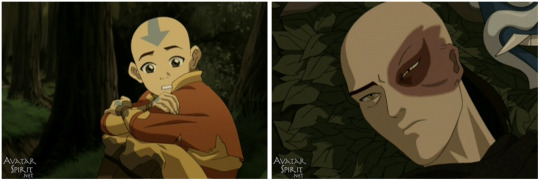
“If we knew each other back then, do you think we could’ve been friends, too?”
The first time the word “friend” is uttered between them, Aang is perched on a branch, waiting for Zuko (who is laid out on a bed of leaves the Avatar made for him) to wake up after his blue spirit rescue. “You know what the worst part about being born over a hundred years ago is?” Aang waxes, “I miss all the friends I used to hang out with. Before the war started I used to always visit my friend Kuzon. The two of us, we'd get in and out of so much trouble together. He was one of the best friends I ever had...and he was from the Fire Nation, just like you. If we knew each other back then do you think we could have been friends too?” The scene stood out for me when I first watched it for the melancholy and stillness. We are not given a flashback like we did when Aang talked about Bumi or Gyatso in earlier episodes. We have to sit with Aang’s loss of a male friend. It echoes a veteran’s loss of a war buddy more than anything a western audience would expect in a children’s show about the power of friendship. Instead of simply mourning, Aang invites Zuko into the past with him. He invites Zuko to imagine a time before the war, a land of innocence, where they could live together. And between them there is a moment of reflection given to this invitation (...until Zuko shoots a fucking fire blast at Aang).
The wistful mood returns when the two boys arrive back to their respective beds. Aang is asked by a loopy fevered Sokka if he made any “friends” on his trip, to which Aang sadly replies, “No, I don’t think I did” before tucking away to sleep. Aang’s mournful moments often stand out against his bubbly personality, but this moment stands out moreso because its the final moment for Aang in the episode. For the first time, he doesn’t receive comfort in his dejection. He doesn’t even confide in his peers. The solemnity and secrecy of this failed “friendship” is remarkable.
It’s in the next symbolic gesture that I think Avatar reveals what’s at stake in the concept of “friendship.” Zuko, in the next scene, lays down to rest after his adventurous night, looks pensively at the fire nation flag in his room, and then turns his back on it. We realize, especially after the previous revelations in “The Storm,” that Aang’s gestures of “friendship” have caused Zuko to doubt the authority of the Fire Nation.
Now all three remaining nations have misogynistic tendencies, but the Fire Nation celebrates a specific brand of toxic masculinity, and Zuko longs to emulate it even after it has rejected and scarred him. In the episode, “The Storm,” which directly precedes “The Blue Spirit,” we see how Zuko failed to replicate masculinity’s demands. In a room of men, he disregards honorifics to speak out in the name of care and concern for people’s well-being over strategy. Though the war room was all men, we later see that The Fire Nation does not exclude women from participating in this form of toxic masculinity. (Shoutout to Azula, one of the best tragic villains of all time!) This gender parity prevents disgraced men, like Zuko, from retaining pride of place above women. So Zuko’s loving act and refusal to fight his father puts him at the lowest of the low in the social hierarchy of the Fire Nation, completely emasculated and unworthy of respect.
Since then, Zuko has been seeking to restore himself by imitating the unfeeling men of the war room and his unfeeling sister, barking orders and demands at his crew. The final redemptive act for this purpose, of course, is to capture the Avatar, who’s very being seems to counteract the violent masculinity at the heart of the Fire Nation. In most contemporary Euro-American understandings, Aang is by no means masculine. He’s openly affectionate, emotional, giggly, and supportive of everyone in his life, regardless of gender. He practices pacifism and vegetarianism, and his hobbies include dancing and jewelry-making. And, foremost, he has no interest in wielding power. (@rickthaniel has an awesome piece about Aang’s relationship to gender norms and feminism).
In addition to the perceived femininity of Aang’s behavior, he’s equally aligned with immaturity. Aang’s childishness is emphasized in the title of the first episode, “The Boy in the Iceberg,” and then in the second episode when Zuko remarks, “you’re just a kid.” Aang, as a flying boy literally preserved against adulthood, also draws a comparison to another eternally boyish imp in the western canon: Peter Pan. This comparison becomes more explicit in “The Ember Island Players.” His theatrical parallel is a self-described “incurable trickster” played by a woman hoisted on wires mimicking theatrical productions of Peter Pan. The comparison draws together the conjunction of femininity and immaturity Aang represents to the Fire Nation.
When Zuko is offered friendship and affection by Aang, then, he faces a paradigm-shifting internal conflict. To choose this person, regardless of his spiritual status, as a “friend,” Zuko must relate himself to what he perceives as Aang’s femininity and immaturity, further demeaning himself in the eyes of his father and Fire Nation culture. The banished prince would need to submit to the softness for which he’s been abused and banished. This narrative of abuse and banishment for perceived effeminate qualities lends itself easily enough to parallels with a specific queer narrative, that of a young person kicked out of their house for their sexuality and/or gender deviance.
I want to point out that Aang’s backstory, too, can be read through a queer lens. Although the genocide of the air nomads more explicitly parallels the experiences of victims to imperial and colonial violence, I can also see how the loss of culture, history, friends, and mentors for a young effiminate boy can evoke the experience of queer men after the AIDs pandemic and the government’s damning indifference. In fact, colonial violence and the enforcement of rigid gender roles have historically travelled hand-in-hand. Power structures at home echo the power structures of a government. Deviance from the dominant norms disrupt the rigid structures of the empire. Aang’s background highlights how cultures based in something besides hierarchy and dominance, whether they be queer cultures or indigenous societies, threaten the logic of imperialism, and thus become targets of reform, neglect, and aggression by the expanding empire and its citizens. Survivors are left, as Aang was, shuffling through the remnants, searching for some ravaged piece of history to cling to.
We begin the series, then, with two queer-coded boys, one a survivor of broad political violence, the other a survivor of more intimate domestic abuse, and both reeling from the ways the Fire Nation has stigmatized sensitivity. But the queer narrative extends beyond the tragic backstories toward possibility and hope. The concept of platonic love proposed here, though it does not manifest until later, is a prospect that will bring peace to the two boys' grief-stricken hearts and to the whole world.

“Do you really think friendships can last more than one lifetime?”
“Do you really think friendships can last more than one lifetime?” Toph asks before the four members of the group hold hands. Since Toph previously mourned her friendless childhood, it’s easy to appreciate this line for its hopefulness regarding the four central members of the Gaang. They long to appreciate that they’re all connected. As touching as this is, the soul-mated ‘friendship’ concept is actually uniquely applicable to Aang and Zuko.
When does Toph ask the question specifically? It’s after hearing the story of Avatar Roku and Firelord Sozin: how their once intimate friendship fell apart; how Fire Lord Sozin began, undaunted, the genocidal attack on Airbenders. After recounting the tale, Aang, the reincarnation of Avatar Roku, excitedly explains to the group the moral that every person is capable of great good and evil. While that moral could easily be ascribed to many people in the series, the connective tissue is stretched directly to Zuko in a parallel storyline. Reading a secret history composed by his grandfather Sozin, Zuko discovers that he is not only the grandson of the empirical firelord but of Avatar Roku, as well. We see how the rift between the Sozin and Roku echoed down across history to separate the airbending culture from the fire nation, and, on a more human level, to separate Aang from Zuko. The two boys find themselves divided by their ancestors’ choices— and connected by Avatar Roku’s legacy.
This is what takes their “friendship” from simply a matter of the character’s preferences to something fated, something unique from the other friendships. The rest of the found family is positioned as circumstantial in their relationship to Aang and one another. Yeah, it’d be cool if they were all connected in past and future lives, but the audience receives no indicators in the series that it’s necessarily true. Only faith holds them together, which allows room for an appreciation that your “found family” friendships might simply be the trusted people you discovered along the way.
Zuko’s friendship is characterized differently. Both his struggle to befriend Aang and his eventual “friendship” are explicitly destined by the story of Roku and Sozin. After this episode, the series depends upon Zuko’s ability to mend the divide inside himself, which can only be done by mending the divide between him and Aang. Their inheritance symbolizes this dynamic exactly. As the reincarnation of Avatar Roku, Aang can be understood as the beneficiary of Avatar Roku’s wisdom (he should not, as many jokingly suggest, be considered as any kind of biological relation of Roku or Zuko). Zuko, on the other hand, has inherited Roku’s genealogy in the Fire Nation. These two pieces of Roku must be brought together in order to revive Roku’s legacy of firebending founded on something besides aggression.
In addition to making the ideals of Roku whole again, the two boys must tend to the broken “friendship” between the two men. As the Avatar and the Crown Prince of the Fire Nation, Aang and Zuko parallel Avatar Roku and Firelord Sozin precisely. The narrative of the latter pair places destiny precisely in the hands of the former. And since both Aang and Roku expressed the desire for “friendship,” it falls in the lap of the corresponding royal to give up their imperial dreams so they can gain something more peaceful and intimate. For Zuko, this now can only be accomplished when he heals the rift within himself.
Importantly, both the previous friendship and the destined friendship between Zuko and Aang are between two men. The coming-of-age genre has proliferated the trope of homosociality (friendship between individuals of the same sex) and its eventual decline brought on by maturity and heterosexual romance. (Check out the beautiful and quick rundown of classic examples, from Anne of Green Gables to Dead Poet’s Society, made by @greetingsprophet ). The story of Avatar Roku and Firelord Sozin replicates this established narrative.
We see them playing, sparring, and joking intimately with one another. The two as young adults were intimately connected, the series explains, “sharing many things including a birthday.” Eventually their intimacy is interrupted by their worldly responsibilities and the spectre of heterosexual romance on Roku’s part.
Now, It’s not a huge leap for one to wonder if Sozin longed for something stronger in their “friendship.” We see no female romantic interests for Sozin. Instead, he continues to demonstrate his platonic allegiance to Roku. When Roku prepares to leave for his Avatar training, Sozin walks into his room and gives him his crown prince headpiece, a gesture of unique devotion that positions his friendship above his politics (which harkens to Plato and EM Forster’s ideas about platonic love that I’ll discuss in Part 3).
One might note, too, how the wedding between Roku and his childhood sweetheart provides the setting for the escalation of Sozin’s violence. “On wedding days,” Sozin writes, “we look to the future with optimism and joy. I had my own vision for a brighter future...” He then pulls Roku away from his bride for a personal conversation, briefly recapturing the earlier homosocial dynamic with his friend. Sozin describes his affection for their intertwined lives. Then he links their shared happiness to the current prosperity of the Fire Nation. He imagines the expansion of the Fire Nation, which would also expand on the relationship between him and Roku. But the Avatar refuses the offer and returns to his wife, insisting on the value of traditional boundaries (both the pact of marriage and the strict division of the four nations). The abandonment of the homosocial relationship by Roku sets the site for the unmitigated empirical ambitions of Sozin. One wonders how history might’ve been altered had the two men’s relationship been sanctified and upheld. How might’ve Roku persuaded Sozin in his empirical ambitions if he had remained in a closer relationship to his friend? In their final encounter, Sozin reacts vengefully to his former platonic love: he lets Roku die protecting the home the Avatar shared with his wife. Sozin’s choice solidifies the divide between them, and makes the grief he’s experienced since Roku left him into actual death.
Instead of Avatar Roku and Firelord Sozin finding a resolution, Aang and Zuko are ordained to reverse their friendship’s disintegration. Yes, they must heal the rift in the world created by the Fire Nation’s aggression, but Aang and Zuko must also reverse the tradition of lost homosociality within a culture of unrelenting machismo. Despite Avatar: the Last Airbender’s ties to the coming-of-age genre, the arc of Aang and Zuko’s “friendship” counters one of its most prominent tropes. “Some friendships are so strong they can transcend lifetimes,” Roku says, and it’s precisely this platonic ideal that draws Zuko and Aang towards one another in ways that are revolutionary both in their world and in the traditions of our’s. To come together, as two matured boys, to form an adult platonic love that can persist into adulthood.
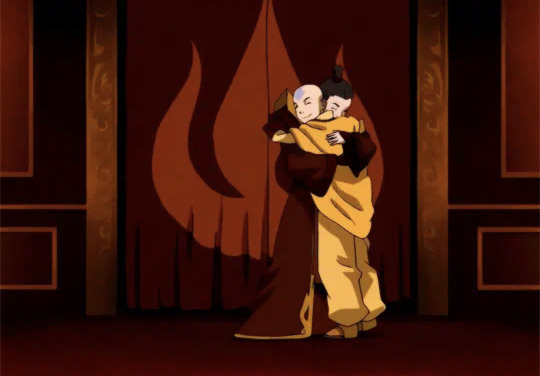
“And now we’re friends.”
Which brings us to the consummation of Aang and Zuko’s “friendship.” Having resolved their previous hostilities and having neutralized the outside forces that would rather them dead than together, Aang and Zuko can finally embrace and define their relationship as “friendship.” Now, if we look closely at Zuko’s expression, we’ll notice a pause, before he smiles and reiterates Aang’s comment. My initial response, with my zukaang shipping goggles on extra tightly, was that Zuko just got friend-zoned and was a little disappointed before accepting Aang’s friendship. When I took a step back, I considered that we are given this moment of reflection to recognize Zuko’s journey, his initial belligerent response to the idea of befriending the Avatar. When he accepts the term of ‘friend,’ he reveals the growth he’s undergone that’s brought peace to the world. With these two possibilities laid out, I want to offer that they might coexist. That the word ‘friend’ might feel to Zuko and the audience so small and limited and yet simultaneously powerful. The pause can hint at the importance of “friendship” and signal something more. This reading emboldens the queer concept of “friendship” that undergirds their relationship. That the hug that follows might be meant to define the depth of the platonic love that is at the very heart of the series.
Saving a hugging declaration of “friendship” for the announcement of peace in the series is quietly revolutionary. In the twentieth century, male characters could connect in battle, on competitive teams, and through crime. “In the war film, a soldier can hold his buddy — as long as his buddy is dying on the battlefield. In the western, Butch Cassidy can wash the Sundance Kid’s naked flesh — as long as it is wounded. In the boxing film, a trainer can rub the well-developed torso and sinewy back of his protege — as long as it is bruised. In the crime film, a mob lieutenant can embrace his boss like a lover — as long as he is riddled with bullets,” writes Kent Brintnall. Aang and Zuko’s hug starkly contrasts this kind of masculine intimacy. The show suggests that environments shaped by dominance, conflict, coercion, or harm, though seemingly productive in drawing people and especially men together, actually desecrate “friendships.” Only in a climate of humility, diplomacy, and peace can one make a true ‘friend.’
In situating the’ “friendship” between two matured males in a time of peace, the writers hearken back to older concepts of homosocial relationships in our fiction. As Hanya Yanagihara has described the Romantic concepts of friendship that pervaded fiction before the 1900s. In her book, A Little Life, Yanagihara renews this concept for the twenty-first century with a special appreciation for the queerness that one must accept in order for platonic love to thrive into adulthood. She writes, “Why wasn’t friendship as good as a relationship? Why wasn’t it even better? It was two people who remained together day after day bound not by sex or physical attraction or money or children or property, but only by the shared agreement to keep going, the mutual dedication to a union that could never be codified.” Aang and Zuko’s relationship, despite a history that would keep them apart, reclaims this kind of friendship. Their hearts, bound together by an empyrean platonic love, are protected from the political and familial loyalties that would otherwise embroil them.
In addition to Yanagihara, another author that coats the word ‘friend’ with similar gravity and longing to Avatar is E.M. Forster, who braids platonic friendship in his writing with homoeroticism and political revolution. In Forster’s novel Maurice (originally written in 1914 but published posthumously in 1971 due to Britain’s criminalization of male homsexuality), the titular character asks a lower class male lover lying in bed with him, “Did you ever dream you had a friend, Alec? Someone to last your whole life and you his? I suppose such a thing can’t happen outside of sleep.” The confession, tinged with grief and providence as it is, could easily reside in Aang’s first monologue to Zuko in “The Blue Spirit.”

Platonic love as a topic is at the heart of Maurice. Plato’s “Symposium,” from which the term platonic love derives, is even directly referenced in the book and connected with “the unspeakable vice of the Greeks”— slang for homosexual acts. For Forster, the sanction of platonic love, both the homosocial aspect and the latent homosexuality, reveals a culture’s liberation. “If I had to choose between betraying my country and betraying my friend,” Forster wrote in his essay “What I Believe,”, “I hope I should have the guts to betray my country.” This echoes a sentiment of philial love described by Plato.
Rather than revolutionary ideals, for Forster friendships, and specifically friendships that disregard homophobia, provide the foundation for peace, equality, and democratic proliferation. When Aang and Zuko embrace, they are embodying this ideal. Platonic love and the word “friend” have a history intertwined with queer romantic love, and, while I won’t argue that Avatar attempts to directly evoke this, I will suggest that the series consciously leaves room for this association. Now, the show certainly makes no attempt to imply anything romantic between Zuko and Aang within the timeline we witness (nor any same sex characters, which reflects cultural expectations in the 2000s). And for good reason, the age gap would be notably icky, to use the technical term. (You might note, however, that the show actually allows for crushes to extend upwardly across the same age gap, when Toph accidentally reveals her affection for Sokka to Suki in “The Serpent’s Pass.”) Despite connecting queer friendships to the history of ‘platonic love,’ Avatar provides two critiques to platonic love for audiences to absorb. One is the pederasty with which Plato defined his ultimate form of love in his Symposium. Fans rightfully comment on the age gap between Aang and Zuko as something preventative to shipping them together. And beyond the fact of their ages, Aang’s youthfulness is emphatic, as I remarked earlier. Aang and Zuko are prevented from consummating their platonic love until both are deemed mature in the last moments of the series. And even then, their relationship is directed toward future development rather than conclusion. Instead of cutting away, they are allowed to exit their scene together toward a speech about hope and peace. This stands in stark opposition to the permanence of Aang and Katara’s kiss. The platonic love in Avatar, the kind EM Forster cherishes, is relegated to adulthood as opposed to other kinds of boyish friendships. The conclusion of Avatar, at least for me, actually feels especially satisfying because it settles our characters in the “new era of love and peace.” It is a beginning, and it feels more expansive than the actions the characters choose to take in the episode. Even as our characters conclude three seasons of narrative tension as the sun sets and “The End” appears on the screen, it feels instead as if their stories can finally begin. The characters are allowed to simply exist for the first time. Yes, Aang and Katara or Zuko and Mai are allowed to embrace and kiss, but it’s because the pressures of empiricism have finally been banished. They are now allowed to try things and fail and make mistakes and explore. Things don’t feel rigid or permanent, whether that be one’s identity or one’s relationships.
Ideally, within the morality of the series (at least as it appears to us with no regard for whatever limits or self-censorship occurred due to its era of production and child-friendly requirements), “friends'' are maintained alongside romantic partnerships. Both Zuko and Aang’s separate romantic relationships blossom within the same episode that they declare their “friendship.” In fact, a vital plotline is the development of Zuko’s relationship with Aang’s romantic interest. While anyone in the fandom is well aware of the popular interpretation of romantic affection between Zuko and Katara because of their shared narrative, I have to point out that romantic feelings across the series are made extremely explicit through statements, blushes, and kisses. Zuko’s relationship with Katara can be better understood in the light of the coming-of-age counternarrative. While the love interest often serves as a catalyst for separation for a homosocial relationship, the friendly relationship with Aang’s love interest—seeking her forgiveness, respecting her power, calling on her support, etc—is vital for Zuko to ultimately create an environment of peace in which he and Aang can fulfill their destined “friendship.” In fact, we can look at Katara’s femininity as the most important device for manifesting Aang and Zuko’s eventual union. It’s her rage against misogyny that frees Aang from his iceberg, midwifing him into the world again after his arrested development, the complete opposite of a Wendy figure. It’s her arms that hold Aang in the pieta after his death in the Crossroads of Destiny, positioning her as a divine God-bearer. Afterwards, its her hands that resurrect Aang so that they together can fulfill his destiny. It will be these same hands with this same holy water that resurrect Zuko in the finale. Only through Katara’s decided blessing could Aang and Zuko proceed toward the fated reunion of their souls.
The importance of this critical relationship to femininity becomes relevant to a scene in “Emerald Island Players” that one might note as an outstanding moment of gay panic. Zuko and Aang, watching their counterparts on stage, cringe and shrink when, upon being saved by The Blue Spirit character in the play, Aang’s performer declares “My hero!” Instead of the assumption of homophobia, I wonder whether we might read Aang and Zuko’s responses as discomfort with the misogynistic heterosexual dynamics the declaration represents. Across the board, Avatar subverted the damsel in distress trope. There’s a-whole-nother essay to be written on all the ways it goes about this work, but the events in “The Blue Spirit” certainly speak to this subversion. It’s quite explicit that Zuko, after breaking Aang’s chains, is equally dependent on Aang for their escape. And, by the end of the actual episode, the savior role is reversed as Aang drags an unconscious Zuko away from certain death. To depict these events within the simplistic “damsel in distress” scenario, as The Ember Island Players do, positions Aang as a subordinately feminized colonial subject, denies him his agency, and depicts the relationship as something merely romantic, devoid of the equalizing platonic force that actually empowers them. The moment in the play is uncomfortable for Aang and Zuko because it makes Zuko the hero and Aang the helpless object. Aang is explicit about his embarrassment over his feminized and infantilized depiction in the play. And Zuko, newly reformed, is embarrassed to see, on one hand, his villainy throughout the play and, on the other hand, see how his character is positioned as made out as a savior to the person who has actually saved him.
At the heart of the series is not the idea of a chosen one or savior. Instead, we are saved by the ability for one person to see themselves in another person and to feel that same person equally understands their own soul. This is the ideal of platonic love. Platonic love between two matured boys—two boys with whose memories and bodies bare the scars of their queer sensitivities—is an essential part of the future of peace. Many fans have a sense of this, labeling the relationship as “brotp” and “platonic soulmates.” I simply encourage people to acknowledge that platonic love, especially in this context, is not a limit. There is no “no homo” joke here. When we remark on the platonic love between Zuko and Aang (and across media more generally) we are precisely making room for friendship, romance, and whatever else it could mean, whatever else it might become. While I find Legend of Korra lacking and in some ways detrimental to appreciating the original series, it’s finale interestingly parallels and extends this reading of platonic love in a sapphic vein. And most recently, She ra Princess of Power was able to even more explicitly realize these dynamics in the relationship between Adora and Catra. Let’s simply acknowledge that Aang and Zuko’s relationship blazed the trail: that peace, happiness, hope, and freedom could all hinge on a “friendship,” because a “friend” was never supposed to be set apart from or less than other kinds of relationships. For the ways it disregards gender, disregards individualism, disregards dominion, platonic love is the foundation of any meaningful relationship. And a meaningful relationship is the foundation for a more peaceful world. *Author’s note: I’m just tired of sitting on this and trying to edit it. It’s not perfect. I don’t touch on all the symbolism and nuances in the show and in the character’s relationships. And this is not meant to negate any ships. It’s actually, quite the opposite. This is a show about growth and change and mistakes and complexity. Hopefully you can at least appreciate this angle even if you don’t vibe with every piece of analysis here. I just have no chill and need to put this out there so I can let my obsession cool down a bit. Enjoy <3
#zukaang#atla meta#avatar the last airbender#platonic love#meta#zuko#aang#plato#maurice#spop#lok#adora#catra#em forster#remember when one person said i seemed manic in the last meta i wrote???#look at me now!#korrasami#catradora#the symposium#kataang#zutara#maiko
305 notes
·
View notes
Text
She Ra - a full analysis
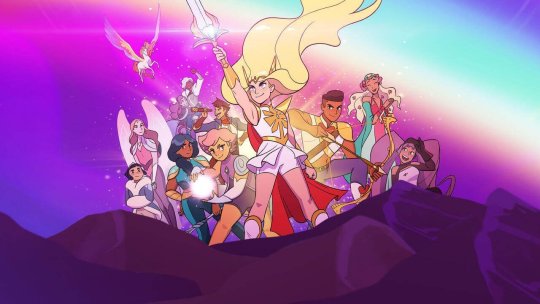
WARNING - THIS ANALYSIS CONTAINS MAAAAAJOR SPOILERS FOR THE ENTIRETY OF SHE RA!!
“You look out for me, and I look out for you. Nothing really bad can happen as long as we have each other”
She Ra is a show about two people torn apart. It’s important to recognise that this multifaceted masterpiece centres entirely on the Catradora dynamic; Noelle herself has expressed that the show was always about those two, and in a broader sense much of the wider world in the She Ra universe can be seen as a complex manifestation of Adora and Catra’s ever changing bond. Adora is not a hero in the traditional sense, as everything about her character is designed to subvert and deconstruct expectations of the hero’s journey. She is a powerful, strong and determined fighter with healing powers, a morally stubborn and highly empathetic person raised in a genocidal regime, and she runs away from the only home and only exponent of love she has ever known because her internal moral compass is just so intense it overrides the truest bond she will ever feel, at least until external factors allow for reconciliation.
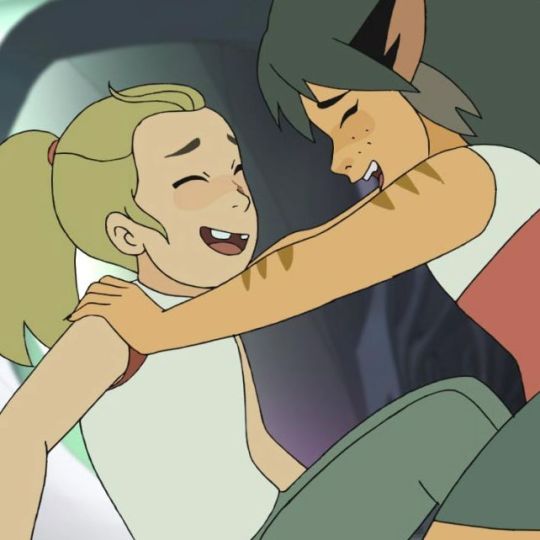
But what defines, at a thematic level, the human interactions in She Ra is a cycle of abuse that begins with oppressive control - Horde Prime. He punishes the imperfections in Hordak to the extent that Hordak feels compelled to lash out, to prove himself powerful by any means. Horde Prime is an interesting villain because his rhetoric centres not around darkness, but light and purity. This is not only a more subversive type of manipulative language than is often seen by cartoon villains, but it clearly establishes Horde Prime as being a fundamental representation of abuse and its tendency to beat away at character traits deemed weak, anomalous, or more importantly unable to be controlled. Horde Prime needs control; he needs subservience and pure, untouched power, which is why he forms his empire around a hive mind. Hordak of course breaks the hive mind itself, but abuse is a parasitic thing, and controls Hordak’s deplorable actions on Etheria right from his first introduction, talking directly to Catra. But the cycle does not stop at Hordak; his monstrous coping methods cause subtler damage by affecting Shadow Weaver. She is an interesting character because unlike Hordak, she was shown to have independent agency in her harmful actions before finding her way to the Horde, but it is clear that the intense sensation of being cast out, before the Horde rescued her only to thrust her into a cycle of rage and exploitation, leads to the final stage of this particular cycle: Adora, and more importantly Catra.

The show makes it abundantly clear that Catra gets the short straw in interactions with Shadow Weaver; and not only that, but it is shown that Catra’s narrative of Adora being a neglectful, selfish pretend-hero is one instilled not by Adora, but Shadow Weaver and her often-times violent favouritism. Adora isn’t selfish or neglectful - her strong moral compass certainly isn’t perfect, and letting go of complete undirected empathy is something she learns in the conversation with Mara in season 5 (“you are worth more than what you can give to other people”) - but those traits are at odds to how Adora is presented, and in particular how her relationship with Catra is presented. Shadow Weaver neglects Catra, and does it to such an extent that Catra is forced into a mindset of breaking her bond with Adora over an injustice that was never her friend’s fault. Shadow Weaver’s manipulation is so powerful, it makes Catra believe that Adora’s protection, her deep-seated love, is malignant. That is abuse: it turns love into hate and protection into violence.
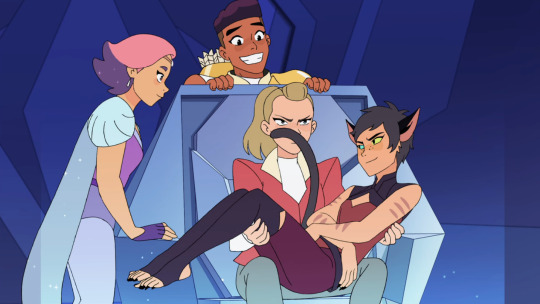
In this cycle, this systematic abuse from Prime to Hordak to Shadow Weaver to Catra, there are two anomalies. They have to be anomalous, uncontrollable, natural, because this cycle begins with oppressive control, and therefore only two variables can violate that base injustice - love, and imperfection. From a meta-narrative sense, She Ra is a unique beast because characters do not simply have flaws for the sake of flaws, but those flaws are the direct reason for the eventual collapse of the show’s main antagonism. What breaks Prime is a kiss, and a mad scientist. The kiss is Adora and Catra displaying a desire for closeness that represents years of struggle against systematic abuse, abuse that has deliberately forced love to become hate, and that only when the cycle reaches its peak and the initial abuser makes a final bid for absolute control, can the true reconciliation begin. The mad scientist is of course Entrapta, whose powerful adoration of imperfection ultimately destroys Prime, or at least his preferred vessel. Abuse of the kind shown in She Ra cannot exist when people find beauty and joy in the things it seeks to eliminate, and Entrapta is exactly the anomaly needed to help break the cycle. Returning to the core of those two lovers, Catra finds her want for Adora, and it is reciprocated because the underlying love was always there, but the intent, the desire for closeness only became apparent when years of unnecessary hurt had been recognised and their true cause exposed: not each other, but the cycle.
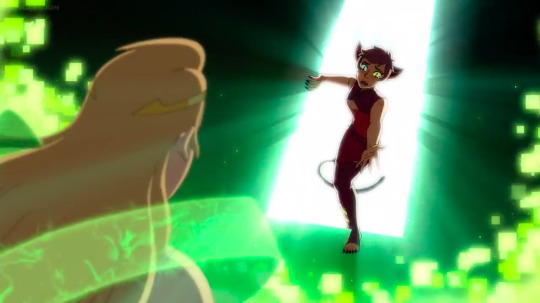
Of course, abuse in the She Ra universe is only actively broken by one thing: love. I touched on this theme earlier when discussing abuse as the two are somewhat intertwined but love, in platonic and romantic forms, is so crucial to the functioning of She Ra’s characters and their motivations. Catra and Adora have always loved each other (they only express this at the climax because they must fight through abuse to find a shared desire), and this love is shown right from both the start of the show, and the first time we see them interact chronologically - in Promise. What’s interesting is we never know how they meet, or what they say to each other first, but instead the earliest canonical Catradora interaction is the promise itself: a dedication so strong it defines Catra’s actions years later on an alien ship as she saves a person she does not even claim to like. The show puts Catra and Adora’s love first, as that is the establishment of their truly meaningful connection, with other flashbacks and all of season 5 expanding upon that bond. We know that love breaks abuse because Horde Prime is abuse and he is defeated by a kiss, but what does that imply?

The kiss, and therefore the confirmation of She Ra’s central love, carries with it a moral lesson, a message, that hurt and abuse can be overcome through the mutual reconciliation that comes with unconditional love. In the show, all kinds of love shown to be beneficial and non-toxic are unconditional: Catra can only want Adora when she accepts that Adora will always be morally upstanding and stubbornly empathetic, and Adora can only want Catra when she accepts that Catra defaults to self-hatred and pushing away, and only when both of these conditions are made meaningless by the force of attraction and belonging known as love, can the kiss be shown and the abuse broken.

Love is not just shown between that central relationship, but throughout She Ra and its characters. Glimmer is a flawed and sometimes maligned character, but her importance to the show and its progression cannot be overstated, especially in season 5. On the ship in episodes 1 and 2, Catra needed something to hold onto. Torn from her home, powerless and very clearly unable to manipulate and fight Horde Prime like she could with Hordak, Catra’s only option became Glimmer. Their bond forms quickly and shakily, but what is so crucial about their interactions is that in order to reconcile with Adora, Catra needed to see someone like Glimmer, who had both made huge mistakes and at one point believed her own mistakes to be the right decision, completely and unconditionally forgive Adora and desire to be home with her. They share love for Adora, different kinds of love, but a strong connection and belonging that in the case of the open and empathetic Glimmer is very obvious. It’s also no accident that later on, during interactions in the expanded Best Friend Squad, Catra takes several social cues from Glimmer first, with Adora a trusted support. Catra is always going to care about Adora more than anything, but it takes the model example of Glimmer to show her how.
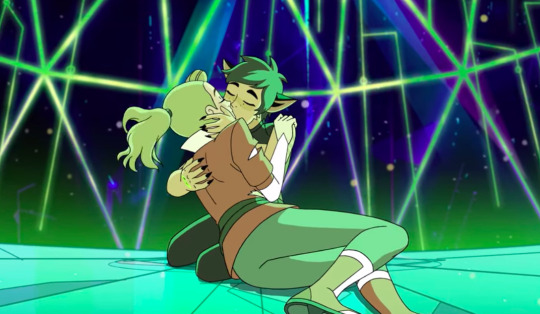
But Adora is not just the subject of Catra’s attractions. As the main character, the dual figure around which the show is built both emotionally and plot-wise, she has a striking amount of agency, but also experiences a corruption of her truest desires at the hands of abuse. The abuse of Adora is subversive and difficult to spot, but it all comes down the pedestal that Shadow Weaver built for her, as well as her own innate morals and how those two factors, in Adora’s mind, prevented her from loving and caring for Catra in the right way. Throughout the show, Adora treats her own need to help others and her desire to be with the people she loves as mutually exclusive; even when Bow and Glimmer remind her that she is not alone, Adora has a penchant for going it alone, believing herself to be this chosen hero who must rescue the people of Etheria without reconciling with herself and her closest friends. In fact, the part of Adora that pushes people away in the name of heroism is not actually her, but instead the cycle of abuse exploiting her moral compass to fulfill corrupt desires that are not and never could be her own. Even the purported good guys do it, the First Ones making Adora believe that her path, her destiny, is to be a weapon. She fights this at the climax of season 4, but never comes to terms with it mentally until the conversation with Mara. And after it has all become hopeless, lost and Etheria is destined to burn away, Catra flips the script. Adora’s truest desire was Catra, but the abuse was too ingrained, the hurt too deep, for these desires to become reality, to be found within themselves. Only when Adora knows her blind heroism has lost, and therefore all to be lost, can Catra, whose arc has now culminated, save the universe. They both found not only their own destiny, but learnt to accept the intertwining of their lives as something that can be a force for good, a force for love.
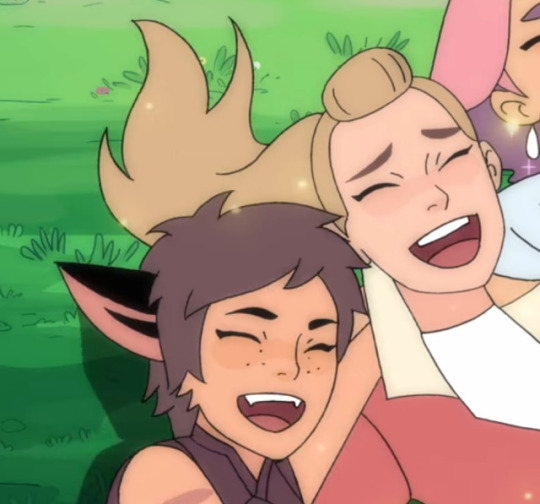
So to conclude, She Ra is not just about being torn apart, but in the end is about two girls fighting abuse as they learn to love each other, and eventually watching the patterns of abuse fade away as they express pure, unconditional love through a kiss that changes everything.
“Don’t you get it? I love you. I always have.”
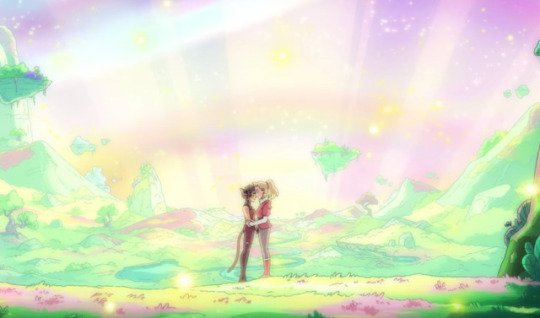
#spop s5#she ra#she ra analysis#adora#catra#god this was such a bitch to write#this show is so complex#lesbian#dyke#she ra season 5
20 notes
·
View notes
Text
the mandalorian episode 7 reactions
spoilers under the cut!
- during my rewatches I have been thinking ‘damn baby yoda has witnessed A Lot of murders/seen his dad get hurt even more’ and found it strange it hasn’t affected him more and little did I know they were saving it all to fucking stab me in the heart with one barbed wire-wrapped zweihander. the scared way he shakes his little green head while mando tries to reassure him fjskdfhaksd T___________T
cara tho of all people. okay this is kind of a crazy idea but bear with me: what if baby yoda picks up a lot on mando’s feelings (in a wordless baby-with-a-Force-connection sort of way -- almost a metaphoric heightening of how babies actually attune to their caretakers in real life), and normally mando is a bit detached/dissociated around others but he’s starting to warm up to and trust cara and it’s bringing him a bit more online and the baby reads that engagement/excitement as danger because that’s the only thing he has to compare it to? like they’re clearly actually having fun but the baby wouldn’t know that because uh mando has never just had fun around him before and to the baby adrenaline seems like adrenaline no matter the source. that might be completely off base but it was what dropped into my brain right away so *shrug*
I’m so grateful mando doesn’t get mad at bb even when he gets scared like that though. it’s good for my soul.
- cara and mando being bros is Life, is Love
- but most of all CARA!!! I love her!!! and the effortless way mando put down his trump card.... “sorry got stuff to do people to beat up no can do my helmeted friend” “’kay. by the way we’re going Imp hunting” “:D:D:D when do we leave”
- KUIIL Y_____________Y actually I refuse (REFUSE) to accept it until someone finds his body and confirms he’s actually dead, I believe denial is my prerogative it’s almost christmas for goodness’ sake
- when cara, greef karga and mando are about to leave for the town I actually SCREAMED at the screen “MANDO REASSURE YOUR CHILD AND TELL HIM EVERYTHING’S GOING TO BE OKAY BEFORE YOU LEAVE HE NEEDS SOME SAFETY” and then he didn’t and then I cried
- pedro pascal did some Things with his voice in this one and it was mean and unfair and uncalled for and awful. the honest hurt and fear in his voice when he says “It tried to kill him”? END ME
- mando straight up doesn’t seem to know anything about the Force at all, or at least not in a way that lets him connect it to the baby. maybe he vaguely knows jedi were a thing but not quite what they actually were. I like that, an interesting showcase of the different perspectives through the galaxy. (maybe finding someone to help out with this is going to be the story arc for next season?
- I actually think this is the first episode where they’ve tried to cover too much in too little time and had to drop the emotional consistency as a consequence. it’s understandable since they need to get all the pieces set up right for the finale, but it didn’t quite work for me (by which I mean for the love of god I needed just one scene, however short, of mando and baby yoda connecting properly with nothing else going on to help me through the stress/reaffirm the bond so it’s unbearably fresh in your mind what this is all for. yes that’s right I wanted them to hurt me more that’s how I roll)
the stuff Kuiil was doing there with his droid story also felt slightly disjointed? out of tune with the rest of the episode? I like him very much and I think I see what they were going for but it felt a little off? mando gently being faced with the fact that droids are naturally neutral and that it’s people who decide what to make them/teach them (yessss go off kuiil!) deserves more space to breathe, this is definitely my least favourite episode so far
- lol @ the empire dude. ‘yeah okay but apart from all the genocide what did we even do to anyone tho???’ in the end he seemed to earnestly admire mandalorian culture in an almost fanboyish way, which doesn’t really surprise me; there must be some decent overlap between people who believed in the empire and people who think the mandalorian tendency towards militarism and (periodic) expansionism is Cool. (which is why I traditionally haven’t cared much for them, incidentally, they’ve always sort of bored me as a warrior culture before this series added some mystical/more overtly religious overtones to the whole thing)
also loved how mando gave him n o t h i n g at all to work with and cara’s ‘who the hell is this guy??’ to the new bad guy lol
- mando averting the fight between kuiil and cara just by being soft and asking for help/reminding them of the kid ;___; I love him he knows how to deescalate a situation when he wants to
also the parallell between baby yoda protecting mando and the droid hovering ready to protect kuiil... right in the feels man. also kuiils air of dignity and experience is so effective. pls be my gruff no-nonsense grandpa who helps me with my computer kuiil
if kuiil is actually dead (which I continue to REFUSE but if) I get the feeling that mando is going to have to Reevaluate some things basically out of respect to his memory, since the way he describes putting this droid back together is framed so heavily as parenthood and surely there must be some empathy for that at least behind that beskar chest plate at this point
I have been thinking that adding a droid to mando’s little uh ‘crew’ would be thematically appropriate so maybe that’s what going on? kuiil said he could reprogram it for childcare, perhaps we’ve found the babysitter we’ve been begging for
- the one-sided vendetta between mando and the very soft spoken, very conscientious, very polite droid is hilarious. mostly because it thus far has manifested mainly in mando presumably glaring behind the helmet and being slightly snippy in saying he won’t come down for dinner like a fucking teenage boy in a sulk fjskdafhsd (I am slightly forgiving of him because droids pointing guns at the kid must be trigger central for him and I can sympathize, it’d take some time to change)
- some other high points of hilarity: three blurrgs and four people in mando’s tiny rustbucket of a ship. “It’s trying to eat me!”. the fact that greef karga was ABSOLUTELY planning to double cross them from the beginning and admitting it openly, he ain’t ashamed (the ‘mando get better friends’ campaign continues). mando describing the spectacular firefight at the end of ep 3 as ‘a bit of a run-in’. baby cackling as he finally gets a turn behind the steering stick of the razor crest. the mysterious multiplying four storm troopers (‘you said four fucking storm troopers karga!!!!’) phenomena. “well there are more. what can I tell you”. mando, with perfect disdain: “on your wall”. the panicked force choke was upsetting but the fact that ‘we do not strangle our friends’ was the Mando Parenting Lesson of the day is undeniably kind of funny.
- anyway I am here and ready to pass out from stress waiting for mando to lose his entire shit and go on a roaring rampage of rescue to save his kid in the next episode (I swear to GOD disney there better not be any between-season cliffhangers about this or I will fucking riot/possibly just die)
ETA: I FORGOT TO MENTION: credit where it’s due the flamethrower did pull it’s weight in this one, I still think he should invest in something more reliable but it did the trick this time and fair is fair
#star wars#the mandalorian#the mandalorian spoilers#man here just have all my feelings this is a debrief before I vibrate out of my skin lol#slightly delirious now I'm going to go drink some water#ETA: now with the part you were all actually waiting for: the flame thrower report!
41 notes
·
View notes
Text
Time for The Witcher episode 4!!
So the last episode was Intense(TM) and also I finally realized that the show isn’t happening all at the same time but it’s following multiple timelines, which, better late than never. Now things make more sense...
Alright, bando alle ciance and let’s do this.
“Ciri! Ciri” Cirilla: yes? “Not you, I was talking to Siri. What’s the weather going to be tomorrow”
That’s such a stupid joke. Unfollow me right now, it’s okay.
Glowy Forest Intensifies... oh, there’s people now. Forest Dora Milaje aren’t happy to see her, which is understandable, I guess. But the boss arrives.
Meanwhile, except not meanwhile, a man has had a very bad day. Apparently the nickname White Wolf has stuck. Remember when we thought the MCU was going to make Bucky into a Black Panther character as the White Wolf, official media outlet even used the White Wolf as a title for Bucky, and then it ended up in nothing? Sorry for the digression but I really hoped we’d get Bucky written by Ryan Coogler and I was really disappointed when that didn’t happen but *waves around* all of that happened instead. I mean, technically it’s not too late to make it happen but Bucky is a Disney+ creature now, so, bye.
Hello Jaskier! My boy! I missed you.
Ah, the new media image campaign is working.
“You never get involved, except you actually do, all of the time” I love this XD “I don’t do emotions or attachments” character who does emotions intensely all the time and gets attached to everyone they meet paired with “sure Jan” character who calls them out is a very good dynamic.
Ah, yes, this is perfect. I’m sorry but dark brooding protagonist and bubbly comic relief sidekick is my secret weakness.
No offense, Geralt, but those clothes did need a good washing after your latest job, so don’t make that face.
Blah blah royal affairs I should probably pay attention to.
“I am not going to protect you” [*Spongebob font* five minutes later...]
But yeah, the princess is Cirilla’s mother, I suppose, and I’m sure the marriage that produces Scream Princess is super important. She is very pretty and has lovely hair. Sometimes I wish I had long hair I could braid artistically.
The princess doesn’t want to get married to some strange dude, but the queen is A Very Strong Woman(TM) and has no time for silly things like her daughter’s feelings over the most life-changing decision in her life. She’s an interesting character for sure, and the narrative doesn’t try to frame her as either definitely good or bad, which is interesting.
Oh! Rat Boy isn’t dead! That’s great. That makes sense narratively, native forest women who suffered genocide from colonizers wouldn’t kill an elf boy who went through the same thing.
Promised husband is a shitty dude. Queen Calanthe likes Geralt, which, relatable. But she and her entourage are racist assholes, and the next scene with Cirilla and Dara tell us that their anti-elf talk isn’t just talk.
By the way, now we know for sure how much time there is between Geralt’s timeline and Cirilla’s.
The queen doesn’t like feminine dresses. Lady is trying to overcompensate a lot. But her banter with Geralt is entertaining.
The first suitor is from Nilfgaard, and in hindsight it would have been a wise choice to unify the two kingdoms... C’mon, poor guy is just awkward, he doesn’t deserve the humiliation. Or is he the guy who’ll make war later? The pilot threw too much new information at me the other day.
Yennefer is bored... and apparently 30 years has passed since the last we saw of her. (I refuse to try to understand when in relation to the other plots that puts this scene. Things will click together at some point or I’ll just accept whatever happens and nod along.) And coincidentally she is paired with a woman who laments being only considered important as a baby-producing womb. Oops. Awkward.
Not relevant to the show but my parents never get inside my room as often as while I am watching something on Netflix.
Yennefer thinks life as a court mage sucks, queen Kalis thinks life as a baby-maker sucks. They envy each other for what the other has, but they’re probably both right.
Well, boredom is no longer a problem.
Oh, poor queen, her husband paid to have her killed because she’s only given him daughters. Two episodes in a row about female heirs to kings, plus queen Calanthe being female and having a daughter who’ll have a daughter. Theeemes!
You can’t be rude to the only person who is your only hope not to die horribly, girl.
Queen Calanthe is frustrated she isn’t a man, which we could guess. She also likes the simplicity of killing, which we could also guess.
Oh! It’s almost pre-decided husband’s time to claim the girl’s hand in marriage, but New Guy appears! He’s been cursed and Mr I Don’t Pick Sides Ever No Matter What, guess what, picks a side. The audience is shocked. No one could foresee this unexpected turn of events.
Noooo the baby!!! Yennefer loses a rare chance to acquire a baby. This is sad. Damn this show doesn’t shy away from killing children, such a different feel from most stories we’re used to.
These people are weird with destiny. Calanthe says fuck destiny, Geralt says lol mood but just because you’re a queen doesn’t mean you’re above sacred rules.
OOOOH Calanthe says fuck sacred rules and it does not go well. Is this happening because she tried to mess up with the order of the world and chaos said hi? Was the princess always magical or did this happen because destiny will have its way no matter what?
Ah, her grandmother had it, she never manifested it before until now, when circumstances awoke it.
Queen Calanthe acknowledges destiny, and of course they’re all dressed in green like the mages of Feminist Hogwarts aka Chaos School. I should have paid more attention to colors but green seems to be the color of magic slash chaos slash destiny.
Then bam, red. Men. Violence.
Everyone in the forest is also dressed in green... Colors aren’t really my thing, you might have noticed that I rarely analyze colors in Supernatural and I’m not particularly into what which color means and I only notice things when they’re very obvious like the purple of transformation-slash-death, so, yeah, I am not the kind of person who notices colors until they slap me in the face. I guess this is my slap in the face by this show’s color palette XD
Also consider that I watch everything with f-lux on, so I don’t even see colors the way they actually look, I guess that’s why it’s harder for me to notice colors when everything looks orange.
Alriiiiight *disables f.lux for current app*
Oh. Oh. So this is how this show looks like.
Awkward. This is so embarrassing.
I should rewatch the whole thing with real colors now... well, another time.
Anyway, Dara has drunk antidepressant juice, but it doesn’t work on Ciri, because she is Relevant(TM) to destiny so she can’t forget her past otherwise the plot destiny can’t happen.
Sleep well baby.
Aaah husband’s curse is broken! Yay.
Geralt accidentally acquires a bond with a baby. One baby dead and Yennefer’s potential bond with her lost, one baby on her way and Geralt’s future bond with her created. So this is all about parallels based on babies and births. Cool.
In the future, destiny has arrived and indeed wrought calamity on the court and the city. Someone makes something gross with Calanthe’s dead body--a spell to learn the location of Cirilla. Trouble is coming.
Oh! It’s him, he’s not dead? And taking something from Calanthe (that will be relevant later)?
Ciri drinks stronger juice and goes to the ancestral plane, er, I mean has a vision of a Very Important Tree, sorry I had Black Panther stuck in my head from before.
Well this is very interesting and things are starting to click together and yeah it’s a weird ride but I’m enjoying it! I suppose only at the end of the season you get the full picture of why and when everything has happened so I’m just sitting here metaphorically eating popcorn waiting for things to make sense on their own rhythm. There’s a theme of motherhood and babies and it seems that Geralt’s destiny is to become a metaphorical mother for Cirilla? Or am I mixing him up with a similar kind of character with a tendency to become everyone’s mom? Anyway, I’m looking forward to see what happens.
12 notes
·
View notes
Text
Conversations in a Quiet Room- Chapter 2
In a universe where everything is the same except Satine survives the Clone Wars and bears witness to the fall of the Republic.
Characters: Satine Kryze, Obi-Wan Kenobi, Bo-Katan Kryze, Anakin Skywalker | Darth Vader, Padmé Amidala
Relationships: Obi-Wan Kenobi/Satine Kryze, Bo-Katan Kryze & Satine Kryze
Tags: Satine Kryze Lives, Post-Order 66, Reunions, Return to Mandalore, Fall of the Republic, Heart-to-Heart, Obi-Wan Kenobi is a Mess, The Twins Are Safe
Rating: G
Read on AO3:
Chapter 2: Saying the Word
20 years too late, Satine finally breaks the stalemate.
That night, much like all the others, was impossible to sleep through.
On top of there being far too much to do to prepare for the plan she and Bo-Katan had ultimately decided was most effective, her head was swimming with agonizing bouts of anger- no, sadness- or was it fear? She hadn't even realized how lost she was to the throws of despair until droplets began to stain the parchment she'd been using to keep record of her plans. And for what? Sitting at her desk and crying about it certainly wasn't going to save her people or bring friends back from the dead or pry the fate of the galaxy from a dictator's hands.
She ran a hand through the blonde ringlets that were unceremoniously hanging just above her shoulders. No headdress or hairpins or clips to dress it up in any fashion. The moment didn't call for any glamor for there was nothing glamorous about anxiety.
No, she had to believe that Mandalore would prevail. It managed to thrive in spite of its planets being 'unlivable' on some standards. It banded together as a collective in times of strife for thousands of years and continuously adapted. It picked itself up after a horrific civil war and dragged itself into a new age under the tutelage of an inexperienced leader with little more than hopes and dreams at her arsenal. And it would survive this.
She pushed her chair away from her desk, determined to use this spark of faith to warm her through the night. She gazed out her window reverently and took a moment to appreciate the Sundari skyline. She wondered what the Empire would change- who would they exploit. Invasion rarely came without the prospect of exploitation, particularly since they recently showed her they were fond of genocide. One of the Republic's last acts was to technically invade Mandalore- though that was at the deliberate demand of Bo-Katan, who knew it was the only way to drive Maul off planet.
It was one of the moments that defined Satine's choice to pass the mantle over to Bo. She made a call that Satine might have never made and it saved countless lives. Tomorrow morning, she would be the new Duchess of Mandalore and the Empire would have her to deal with. It was poetic justice in a sense, because Satine reasoned that they were getting the scrappier of the Kryze sisters. They just didn't know it yet. She would play her part and build Mandalore up in the shadows- a place her people had been for far too long. They would think Bo stole it all and that Satine was weak, but anything to elevate them to the best possible outcome.
A strange ship entered the biosphere and Satine felt something within her seize up.
Had they come?
"Don't be ridiculous, they wouldn't just send one ship." She thought. "And certainly not of Alderaanian make."
She did her best to quell any nerves that crept up on her. The ship had landed on one of the royal landing pads.
They'd announced Obi-Wan's death on the holonet earlier that afternoon. It happened on Utapau weeks prior, just a mere minute after the cursed order had been given. He was shot from behind by Commander Cody, who Satine remembered. She met this man. She shook his hand after being introduced by Obi-Wan. They seemed to be friends on and off the battlefield.
And he shot him in the back. Obi-Wan fell into the water below and never resurfaced.
How had they phrased it? Oh, he was apparently "fleeing arrest", which couldn't have possibly sounded less like Obi-Wan.
Anakin's death was announced shortly after, evidently a casualty of the initial burning of the Jedi temple. Ahsoka's lightsabers had been recovered, but no trace of her. She was no longer a part of the order, so Satine absently wondered if they'd look for her with less scrutiny.
She was only a child.
Satine was convinced that none of this information fully resonated with her just yet. She was in a meeting when it had blasted across the screens without warning. Before she could even have the opportunity to turn it off, there was Obi-Wan's handsome face staring back at her with the confirmation that he'd been accounted for. The room was silent after the message ended and her entire round table looked to her, waiting, gaging, trying to see what she required of them. Because what does one say when the murder of a close friend was announced in the middle of a budget meeting?
Satine went with, "And as for the transportation tax..."
Business, as usual.
She would deal with it. She'd have to. It seemed after this transition of power settled in, she would have bounties of time to come to terms with the loss of her... Obi-Wan. His place in her world was never clear, but his place in her heart was extensive and for that, she would have no choice but to mourn him and the piece of herself that laid dormant for too long... Reignited only by his tendency to boomerang back to her whether by his own volition or not. She'd taken care to never pine for him in the years they'd been apart, because Satine Kryze does not pine and certainly not for someone that was always just out of her reach. She'd even had the occasional suitor here or there, but she'd be a liar to say anyone truly inspired her the way he had.
Thinking of him in past tense cracked something hollow within her, especially when he felt so present.
The doors behind her swished open swiftly and she had half a mind to snap at one of her attendants for their lack of courtesy. How dare they interrupt her pity party! She thought better of it, of course, and waited for whatever news they had for her.
"Hello, there."
She whipped around to prove that no, her ears were not deceiving her, because leaning against her doorframe like he'd always belonged there was one disheveled and battle-worn Obi-Wan Kenobi. For a woman that rarely had the breath stolen from her, she gasped. A swell of emotions overtook her- the first of which was notably relief, followed by confusion and anger, of course there was anger. She could not decide whether she wanted to run into his arms or smack that ridiculous beard off of his cocksure face.
That anger seemed to boil to the top of her priority list, forming from an intense manifestation of the fear and anxiety that had riddled her for the past few weeks- all coming to fruition towards him whether it was fair or not. She'd thought he was dead! He let her believe he was dead for nearly a month! And the best he can do is appear without warning in her room, with a stupid smirk on his face?
Oh, she had words. Words were her fire and now that she had the affirmation that he was somehow alive, she was going to use them, dammit. She stormed towards him, a finger outstretched and ready to point at him for emphasis.
"Why, you-" They died on her tongue the second she got a better view of him and could see how ragged he truly looked. He looked like he hadn't slept in ages with dark circles under his eyes, a definitive slouch in his stance which offset his usual air of perpetual confidence, and an overall weary look in his eyes. His tunic appeared to be singed and marred with ash. That very same ash speckled across his beard and on his boots. On top of that, he seemed to have a slight limp as he was clearly favoring one leg over the other.
Overall, he looked like a broken man. And for as stressful as these past few weeks had been for her, her chest felt like it could concave at the thought of what he'd been through; what he'd lost.
Still, the only thing Satine could seem to say was, "You look dreadful!"
"And you as lovely as ever." Such sentiments used to make her blush across the campfire what felt like ages ago, but not now. "I do apologize for any worry I might have caused you. I was slightly tied up."
His casual quip did not frustrate her this time for it was obvious he was deflecting. Instead, she approached him and took his face in her hands, running her thumbs across sharp cheekbones and down his bearded face to hold his chin. He somehow looked even more exhausted up close and there was a carefully crafted coyness in his eyes that was thinly shielding a heavy weight. Someone who knew him less might fall for the levity he attempted, but she was not so easily fooled and knew more layers of him than he'd probably care to admit.
When she determined that he was physically functioning, she met his eyes again and felt her heart break all over again as he shifted in his stance. "Satine..."
He did not stare at her with the caution of someone flying too close to the sun as he seemed to lately. He looked at her with his heart as near to his sleeve as a man like Obi-Wan could allow. She sought that as her opportunity. As much as drinking in his being alive was soothing to the fire of unrest that raged within her, it was not enough to extinguish it altogether.
"The holonets say you're dead."
"I've never been very good at dying." He laughed weakly.
"Yet you always seem to be trying." She said softly.
"For as horrible as I seem to be at dying, near-death experiences happen to be a primary skillset of mine."
"I do remember that about you."
"Those weren't all because of me." He emphasized.
"And what about Anakin and the others? Do they..." She held in a shaky breath. "Do they share your predilection for close calls?"
He reached up and held her hands in place over his face, running a thumb along her wrist. They'd not been this affectionate since their year on the run all those years ago during the Mandalorian Civil War, but simply having the knowledge that he was still a tangible and living presence was just not enough at the moment. She needed the absolute physical proof that he was here and not about to evaporate into existence or into the Empire's evil clutches. As for him, he looked like he hadn't interacted with someone that wasn't pointing a blaster at him for quite some time.
"They did." And it was the ever purposeful utilization of past-tense along with the defeat in his tone that made it all too real. It was one thing to hear it on the news or to spread it from word of mouth, but to be standing in front of a man that was already becoming a relic of a different time... Was a different experience altogether. The knowledge of the Jedi's increasing obsoletion certainly made her all the more grateful that this relic was in front of her at all.
She dropped her hands, which suddenly felt too heavy to keep held in one place. They didn't go far, settling instead on his chest over the scorched lapels of his tunic. He wobbled forward a little too much and it became obvious that he was unable to stand and continue this conversation. She reached down and guided him to the edge of her bed so he could sit. Had he been in better spirits, he would have made some smart comment about her wasting no time in getting him to bed while she would have returned with some well-articulated slight suggesting performance issues.
Instead they sat with knees touching, feeling grounded for the first time since the galaxy decided to open up beneath them.
"Anakin's dead, Satine." Was what he went with, which she knew was the crux at what really ached him. She was not force-sensitive in the slightest, but could feel that specific pain emanating off of him. The love Obi-Wan had for his former padawan was evident. The Jedi were never allowed attachment, but were given children to care for and practically parent. No, it did not make sense, but she never voiced this contradiction. She questioned a lot about the Jedi Order in her time spent with Obi-Wan, but never in the love or camaraderie they felt for each other.
Forgoing her initial desire for answers, she reached a hand up and dusted some of the ash from his auburn hair. "I'm so sorry, Obi."
"And it's my fault." He said.
Always the guilt-martyr. "That's not-"
"-I sliced off his limbs and left him to burn." He choked out and turned to her, all pretenses shattered from behind his dark blue eyes. "I killed him."
She pulled back, but only slightly, eyes wide and posture frozen. At this point, she felt like she'd heard everything in her life. "Explain?"
He sighed and leaned forward, pinching his brow between his fingers. "Mace Windu did try to kill Palpatine."
"Okay?" Satine could see that Obi-Wan was definitely not in the spirit to have the life shaken out of him, but her resolve on the matter was growing thinner and thinner as he continued to drop short and curt details that made absolutely no sense in the present universe that she lived in. It did not help that he did so with an expectation that she understood.
"But..." He shook his head. "Not because there was a Jedi Uprising."
"I know that." She said indignantly.
He lifted his head with great effort to meet her gaze. "Palpatine is a Sith Lord."
She did not know that.
Satine's jaw set. She did not know nearly as much about Jedi history or lore as she did Mandalorian history, but she did know enough to know that Sith typically traveled in pairs. This entire Clone Wars, the Republic was on the hunt for this other Sith Lord after first encountering the evil Darth Maul and finding him to be the apprentice. Then, there was Count Dooku, who was yet another apprentice. That horrid Ventress somehow did not count. And the war ended without any mention of another Sith.
Which she felt horribly stupid for not coming to such a conclusion on her own. Of course the present leader of the galaxy was a Sith Lord.
"That's why the Jedi confronted him then." She said and at Obi-Wan's nod, she grimaced. "And I'm guessing he meets his end after the video cuts off."
"Curious how they managed that, huh?" He sighed, "In doing so, they also cut out the part where Anakin falls."
"Falls?" She wrinkles her brow. "From where?"
"No... He..." And it looked like Obi-Wan would rather vomit than speak his piece. "He fell to the dark side of the force."
She gasped. No, that couldn't be right. Not Anakin. She remembered him clear as day at their doorstep a mere few months ago. He was impetuous and rebellious- definitely not one to color within the lines- but radiated goodness all the same. He cared for his soldiers and respected his elders. He cared so greatly for Obi-Wan and Ahsoka, if not always in line with the rest of the Jedi. This was beyond clearer than anything else.
But Obi-Wan would not be slumped over beside her if this was not true. His elbows rested on his knees as he rubbed his face. "He was the one who gutted the temple."
"How..." Her voice was small and so unlike the regal or firm tones she typically used. "How could he do that to his friends? His mentors?"
"They were not his friends and mentors." He shivered. "They were predominantly padawans and..."
"Younglings?" She asked, but it sounded like a desperate plea.
The silence was damning enough.
She choked down a sob of her own, but had little to say in response to that. Even for someone as eloquent with words as Satine, there wasn't anything you could say to appropriately respond to the news that someone near and dear not only crossed the line of evil, but went so far as to take the lives of the most innocent.
"And I still couldn't follow through. Even after knowing that." He shuttered. "I failed. I- I failed him."
She slid off the edge of the bed and into a kneeling position on the floor in front of him, imploring him to look at her. "No, you did not. If anything, he failed you."
He did not reply to that just as she knew he would not. She'd been right before at assuming he was accepting responsibility at its entirety for this whole mess. She just did not know the angle of it. In a sense, she could not blame how he came to that conclusion. She'd witnessed firsthand the bond between a Master and an Apprentice up close. It went beyond a simple mentor/mentee process, but had familial and friendship layers to it. It was a lonely galaxy for a Jedi and oftentimes the family found within that order was their reprieve. Now, all of that was torn to shreds and the very same way Satine blamed herself for the path Bo-Katan chose, Obi-Wan blamed himself for Anakin's fall.
"He failed you, Ben." She repeated and used the name she'd coined for him when they were undercover on the run. It became something of a fond pleasantry only reserved for serious moments. She'd never lived a moment more serious in her life and she'd been close to meeting her end at the hands of a former Sith.
He looked up to meet her gaze with glassy eyes. He looked so unlike his normal self- so the very opposite of a Jedi, and maybe he could sense that she noticed this, because he reached out and took her hands in his, like he needed to explain to her that everything horrible in the galaxy was, in fact, his fault.
"I raised him."
"Would you sooner blame me for Bo-Katan's indiscretions with Death Watch?"
"That's different."
Considering Bo-Katan never touched a single hair on a child's head, yes, it was miles different, but the principal at the core still remained. Satine was a master negotiator and could triumph Kenobi yet.
"You are certainly not perfect," She squeezed his hands and he snorted, "But you were a good Master and you did what you could. Anakin was free to make his own choices and failures. I know you will not allow me to absolve you of entire guilt nor will you ever hate him, but I encourage you to think back to what your Jedi Master would say."
"Qui-Gon would say it was the will of the force." He sighed, "Said that about everything, didn't he?"
She smiled softly. "He certainly had a way about him."
"I miss him." Obi-Wan admitted, which under any other circumstance he would not voice, even if he felt it. "I am glad, in a way, that he did not live to see this."
At some point during their maudlin conversation, it had begun to rain outside, which while the rain on Mandalore was scheduled, it always seemed to catch her off guard. Even more shocking, Satine hadn't noticed it until an artificial crack of lightning broke across the sky. The flash reflected off of Obi-Wan's face and for a moment she could see the young padawan that came to her aid so long ago, who absconded her heart during stolen glances across a makeshift campfire and proceeded to break it when he left. After all this chaos, there was still hope in the man's eyes.
"There's more." She prodded.
He quirked a brow. "You've always been nosey."
She scoffed, "Well if you don't want to tell me-"
For a second, his hardened features softened and it was clear he was giving in. "Padmé's children survived the birth and I must ensure their safety."
She let that factoid linger in the air for a moment before adding to it the detail that Obi-Wan would not, for reasons that he was likely coming to terms with, because if Satine could really take a wild gander, had been the source of all of this. "They're Anakin's aren't they?"
For a second, Obi-Wan snapped out of his sorrow and look at her in an almost comical surprise. "You knew?"
"Was it not common knowledge that they were together?"
He stuttered. "No! I was not- I mean I had my assumptions that he- No! We're Jedi- We..."
"Hush now, Obi." She sighed, "Do you really think you are the first and only Jedi to play with fire?"
Her gaze was knowing and he returned it in kind and for a moment, she was transported to memories that seemed a millennia away- one where they were treading from planet to planet, through all terrain, not quite sure what the next day would bring. It was easy to grow close with someone after being forced together by the elements. It was all the easier when that someone was Obi-Wan Kenobi. Of course, nothing could ever be easy between the two of them. A figurative mountain of obligation stood between them. Still, they'd managed to poke cracks through the surface and allow some light to peak through, whether allowed or not.
But Obi-Wan walked away that day in a way that Anakin could not. For Obi-Wan, it had always been one or the other- never both, and Satine could never bring himself to make him choose. It would have made her too guilty... To take him away from his lifestyle. She certainly would have grown to resent him had he made her choose between him and Mandalore. She could not do that to him and she could not do that to herself. Instead, they stood with the sun casting shadows on their faces on that last day, staring at one another and waiting for something until the thing they waited for could never come and before they knew it, they were parting ways.
He was so very much the strong and faithful Jedi back then and his future was so very bright. She had a community to turn into a city all by herself, but believed her future could also be bright.
No such promises existed now.
And with that, along with how terribly it hurt to look at him like this- to see how the force managed to chew him up and spit him out and still have the audacity to request more of him, she realized that she'd take the burden of his possible resentment if it meant their lives would be better than what they had now. The tiny voice inside her head told her that Obi-Wan could never resent her and she still hoped that rang true.
"I'm calling it." She said abruptly as though she was adjourning a business meeting.
He furrowed his brow at her in a way that let her know it was her turn to elaborate.
So, she gathered all the courage she could muster and went on with a conversation that likely should have occurred much sooner. "Forgive me if this is 20 years too late, but I have to ask. I cannot bear to see you continue on like this and frankly, I'm not sure if I can either. Stay with me... Please?"
For a moment, it was just them in the entire galaxy. There was no genocide or newfound tyranny or impending invasion. Just them and Satine swore she could hear her own heart thrumming in her ears. She waited for this frustrating man in front of her to decline. How could he step away now when the galaxy needed him most? There were children involved, evidently. The leader was a Sith Lord! He was a wanted criminal. The list of why they should not seemed to grow longer by the second, but she banished all of those thoughts, because all she wanted right now was for his safety.
"You're saying the word." He said incredulously.
"I am." She never broke his stare.
He choked out what she could not tell to be a laugh or half a sob of relief, but he lifted her hands and kissed them both. "Shouldn't I be the one on bended knee?"
Shock permeated across her chest for a moment, before stubbornness settled in. She patted his knee gently, to which he winced; making the silent point that he was in no shape to make such a gesture. "I asked you first."
There was a softness in his features that she always adored and this moment, despite his being through hell and back, did not change the way he looked at her. He reached out and framed her face with his hands. She took comfort in the familiarity of the callouses that brushed along her cheekbones and leaned into his touch.
"I accept."
Her heart was still filled with a world of hurt, but she pushed all that away in favor of a true and genuine smile to break through the sorrow. She was delighted to see that through glassy eyes and frown lines, he mirrored her expression. A glimmer of light in a dark space. Love would not cure all of their problems or heal them whole, but it would help. They'd spent too many years rejecting it and they still ended up where they sat, so maybe, a different tactic would be useful to them.
It was small, but it was enough for right now.
"I hope you know what you're getting yourself into." He joked and smirked when she rolled her eyes.
"Oh, shut-up." And she closed the unbearable distance and kissed him soundly.
After a gratuitous amount of that, she made a curious sound in the back of her throat and he pulled away instantly with a vulnerability she was not entirely used to (but certainly fond of). "What?"
She shrugged and ran a hand along her own face. "I'll have to get used to the beard."
He scoffed, "It can never be easy with you, can it?"
"I hope you know what you're getting yourself into." She mimicked with his drawl and all.
"I do love you anyway." He sighed and perhaps the confession shouldn't have startled her the way it did.
That being said, she would not resist the urge to return the sentiment. "And I, you."
There was still a child to look after somewhere across the galaxy and a Mandalore to distantly keep tabs on. The Empire would call them back to oppose them and there was the fact that both of them were about to become wanted criminals. Their obligations still pulled them every which way, but Satine felt warmth flow through her bones with the knowledge that she was finally allowed to be attached. She'd never known herself for being capable of crying and laughing at the same time, but it worked all the same.
#star wars#the clone wars#tcw#obitine#obi-wan kenobi#satine kryze#myfics#chapter 2#this was written to cure my depression over my recent rewatch#and it worked a little
13 notes
·
View notes
Text
Free Solarpunk Essay for your thoughts
There’s not many essays and findings in academia that are given away to anyone without special access, so since I just got a 100 on my Environmental Ethics Reflection Essay, I’m posting it here for solarpunks it might benefit to think about these ethics considerations. (hit read more for essay)
My environmental ethic in recent years has grown to center around bolstering man’s integration with the environment. I see almost any given postulation regarding land use ethics to pat its own back while its front is on fire. In other words, people’s ideas about the proper use or stewardship of the environment always hit a wall when challenged in their authority. This wall is also invisible, so to speak, meaning where a moral or ordained boundary (or lack thereof) cannot be decided on without agreeance upon what humanity “should” be doing with the planet it is occupying. I have, in my infinite naiveté as a single human being with single brain, begun to embrace how “Capital I Integration” may be the most productive way forward in how man both heals and continue to utilize the environment for its inevitable “progress”—whether or not we can all agree it was ordained to make such progress.
Firstly discussed will be how the idea of integration relates to the documentary film In Light of Reverence, where indigenous North American people are interviewed in opposition to Western culturists, typically Caucasian, where the two parties clash over the use of various natural areas. Perhaps it’s more accurate to state that the film is highlighting the “innate stewardship” that Native Americans have shown since their use of North American lands began and the Manifest Destiny-driven sense of construction, innovation and progress that European settlers brought with them along with their genocidal colonization effort in the Americas. With God as their witness, and the power of their environmental use destiny still uncontested, Western lineages in the United States can’t be discounted in environmental ethic due to the gravity of their claim to have been ordained as fate-bound stewards of the land.
In contrast to the western settlers and their intent to use sacred grounds for recreation and “weekend conquering,” Native Americans—dwindling in number and power since the pilgrims came—still hold firm in their also-religiously-mandated approach on worshiping the land literally. The irony is how these peoples had originally not occupied these lands either, and that their rationale does not extend beyond what they are religiously (and/or culturally) inclined to believe about environment use. Native Americans believe in serving and protecting the land (read: environment), only using what is necessary for survival from it. While it can be easy to think this approach to man’s exchange with his environment is most productive in the new Anthropocene Era, there are myriad counterarguments available to support how now, more than ever, humanity should be developing technologies to stitch the wounds inflicted on our planet by the same technologically-prone cultures which caused them. Here we find how these (and other) ideas about how man should relate to the planet reveal themselves to be culturally masturbatory paradoxes the moment they’re challenged by anyone who can zoom out their thinking far enough to examine them from outside the scale of “man versus man.”
As a frequent explorer of existentialism and ethics considerations, I know that where paradoxes are found, danger lurks—not unlike how Val Plumwood’s advising ranger warned her that the swift currents of a main river in the Kakadu wetlands would bring her into the gnashing teeth of crocodiles. Plumwood would, out of selfish curiosity, find herself in these areas anyway on her exploration of the paperbark wetlands, and it is by the same selfish curiosity I worry mankind will continue exploring the forest of environmental ethics paradoxes until they find themselves in their own set of gnashing teeth. Val Plumwood has the wherewithal to know her run-in with the wild element of nature was not indicative of any malicious intent of nature. Instead, Plumwood echoes in Being Prey how the crocodile who had nearly eaten her should not be condemned, for man is physiologically part of the food chain regardless of his beliefs or origin.
So, too, is man part of the environmental stability chain regardless of his beliefs or origin. In the next century and beyond, the way humanity treats the planet will determine how safe it is. Plumwood’s warning was “stay clear of dangerous waters” and our warning as a species in the 21st century is “stay clear of environmental paradoxes.” In other words, if a notion about how to interact with the environment was planted in a factually unverifiable bed of soil (like religious ordainment, for example), it must be repotted at the dawn of the Anthropocene Era as the human race begins to work as an increasingly collectivist organism.
This is where I find myself embracing wholly the idea of integration with nature rather than preservation of or stewardship of it, or so on. I find that, since construction/progression is inevitable in the cultures that cannot be dissuaded from having that sort of influence on the environment, the productive elements of that worldview should be taken and adapted with more preservationist worldviews to balance the destructive tendencies of either (here referring to how Western culture views the lack of use of the environment as a “waste,” thus it is equally as destructive as their pollution from cities, etc.)
When viewing the future of cities and human-nature cooperation from “integrationist” eyes, cities look like structures within natural environments rather than separate or in opposition of them. Wildlife is relatively unhindered, yet commerce, innovation, technology and civilizations in general can continue to thrive and grow so long as they are carbon-neutral or better. Saturated sustainability taking priority creates a “new final frontier” for “alpha cultures” like those of the US, Europe, Russia, Korea, to compete to dominate in. Singapore, Costa Rica, etc. are finding explosions in growth since their refocusing on a sustainability paradigm within their infrastructures, and the dying embers of post-war-obsessed generations and countries will finally be rekindled with senses of cultural pride as soon as the race for sustainable cities and nations becomes the new standard for economic value.
Talking more specifically, biomimicry in design is growing in its influence across all industries. Mimicking nature, designers of all sorts of things have discovered that efficiencies beyond imagination can be unlocked the moment something is redesigned according to nature’s exact specifications. Theologians and scientists can both agree on the results, since biomimicry does not need proof of either. The invention of Velcro as an “adhesive fabric material” benefited humanity the world over—whether it was evolution and adaptation or God who developed the burs which stick so easily to animal fur, where through nature the invention was discovered. The Shinkansen bullet train was changed to not create sonic booms when exiting tunnels any longer, not because of a redesign formed by a human, by a redesign according to the exact specifications of a kingfisher’s avian beak. Termites are teaching us how to design sustainable buildings, dolphins are teaching us how to send signals underwater, humpback whales are teaching us how to create efficient wind power. The list goes on and will only grow as more of nature’s processes are examined for the sake of man’s sustainability and integration with nature.
As an author for the solarpunk movement, a new genre of fiction exploring eco-centric futures of man’s relationship with the environment, I absolutely stand behind the idea of integration between the two. A zero-waste preservationist would say integration still can damage and change the environment, and a fossil fuels industry billionaire would argue that integration would disrupt socio-economic prosperity the world over for the “boring” notion of balance between man and nature. I find that, usually, when two opposing extremists equally despise a compromising ideality, it’s probably the best possible solution to move forward with in the complex Venn Diagram that is “practical ethics”—and I’m sure the motion carries to environmental ethics in the first century where they really, truly matter. Only time will tell, as always, yet in this case, time is very, very angry. I guess for once, compromise might have to take precedent in the eyes of the collective human race.
#solarpunk#environmental#ethics#essay#TIL#academic#ecology#climate#global warming#climate change#deep ecology
75 notes
·
View notes
Text
(tws at bottom)
I get that Sylvia Plath is very understandable in terms of feminine pain and mental health-but y’all have to understand that she was a white supremacist. Lily Shanagher states, “Plath’s diaries dating back to her high school years show a history of hateful and disrespectful white supremacist thinking” (Holding Sylvia Plath Accountable). We see this racism manifest in her works. Her infamous novel, the Bell Jar, is laden with harmful stereotypes. She insults Asian people, Latinx people, Indigenous people, and African Americans. She calls a woman with tanned skin a “bleached-blonde negress”. Her white female protagonist in the book, who serves as a placeholder for Plath’s own self, describes looking into a mirror like seeing “a big, smudgy-eyed Chinese woman staring idiotically into my face”. Crystal Contreras writes, “Probably the most glaring examples of racism comes during a scene where Esther is being served dinner while in the mental health institute. The man serving her is described as a stupid, laughing, indolent Black man with huge, rolling eyes, a racist trope made popular with books like "The Story of Little Black Sambo," which was published in 1898… During this scene, the man commits the offense of serving two types of beans for dinner, … and Esther punishes him for it by kicking him. You heard that right. She physically assaults a Black man for serving two kinds of beans and he runs away moaning cartoonishly” (It’s Time We Had A Talk About “The Bell Jar,” the White Feminist, Racist Literary Icon). It is clearly evident that she is a white supremacist. But wait, there’s more! In Lady Lazarus, the poem my class was supposed to analyze, she details her suicidal inclinations-by comparing her journey to the Holocaust. The Holocaust. She writes, “A sort of walking miracle, my skin / Bright as a Nazi lampshade” (Plath 4-5). Nazis made lampshades out of the skin of Jewish people they murdered. She made a direct comparison to that. And she doesn’t stop there. Next, she wrote, “So, so, Herr Doktor. / So, Herr Enemy” (65-66). For clarification, Herr means Mister in German. And Mister is a title, and therefore does have connotations of respect tied to it. The Mr. Doctor is a reference to Holocaust doctors who patched Jewish poeple up just so that they could endure more torture. She is saying that the Doctor saving her life is comparable to the torture Jewish people endured in the Holocaust. Finally, she pens, “A cake of soap, / A wedding ring, / A gold filling” (76-78). I searched this up, and I found out that Nazis used the bodies of dead Jewish people to make soap (Lady Lazarus by Sylvia Plath) The wedding ring and gold filling part is talking about how Nazis used to search through the ashes of Jewish people they murdered for valuable items. The Holocaust-a genocide that killed 6 million Jewish people in horrific, inhumane ways is what she is using to describe her suicidal tendencies.
“Lady Lazarus by Sylvia Plath.” Poem Analysis, 12 May 2021, https://poemanalysis.com/sylvia-plath/lady-lazarus/.
“It's Time We Had a Talk about ‘The Bell Jar," the White Feminist, Racist Literary Icon.” Willamette Week, https://www.wweek.com/arts/books/2017/10/04/its-time-we-had-a-talk-about-the-bell-jar-the-white-feminist-racist-literary-icon/.
Plath, Sylvia, and Ted Hughes. The Unabridged Journals of Sylvia Plath. Anchor Books, 2000.
Plath, Sylvia. The Bell Jar. Faber & Faber, 2019.
Shanagher, Lily, et al. “Holding Sylvia Plath Accountable.” The Oxford Blue, 23 Feb. 2021, https://www.theoxfordblue.co.uk/2021/02/23/holding-sylvia-plath-accountable/.
“I feel outcast on a cold star, unable to feel anything but awful helpless numbness.”
— Sylvia Plath, 13 October 1959, The Unabridged Journals of Sylvia Plath
#social justice#sylvia plath#discrimination#xenophobia#race#poetry#poem#poems#prose#anti blackness#white feminism#feminism#women
2K notes
·
View notes
Text
CHAPTER SEVEN : CONVERSION THERAPY

This one is going to be easy. This is an opinion piece. A inflammatory commentary of some monstrous practices. A pile of insults for a pile of shit : CONVERSATION THERAPY, the worst of humanity with genocides and Keeping Up with the Kardashians.
WHAT IS CONVERSATION THERAPY ?
“So-called Conversation Therapy is a range of dangerous and discredited practices that falsely claim to change a person’s sexual orientation or gender identity or expression” — Human Rights Campaign

I’ll let The Trevor Project explained it to you : Conversion therapy, sometimes referred to as “reparative therapy,” is any of several dangerous and discredited practices aimed at changing an individual’s sexual orientation or gender identity. Conversion therapists use a variety of shaming, emotionally traumatic or physically painful stimuli to make their victims associate those stimuli with their LGBTQ identities. According to studies by the UCLA Williams Institute, more than 700,000 LGBTQ people have been subjected to the horrors of conversion therapy, and an estimated 80,000 LGBTQ youth will experience this unprofessional conduct in coming years, often at the insistence of well-intentioned but misinformed parents or caretakers.
A QUICK HISTORY OF CONVERSATION THERAPY
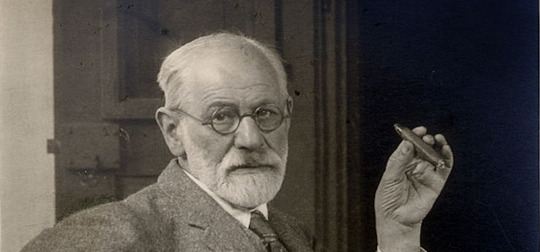
Early 20th Century. Sigmund Freud stated that homosexuality could sometimes be removed through hypnotic suggestion. In his paper “The Psychogenesis of a Case of Homosexuality in a Woman”, he wrote that changing homosexuality was difficult and possible only under unusually good conditions (fear of society’s disapproval was not considered one of those). Success meant making heterosexual feelings possible, not eliminating homosexual feelings. Sure. Different time. Different ideas. Also, fuck you. I will give points to Freud with his response to a letter from a mother whose son was gay : “I gather from your letter that your son is a homosexual. … it is nothing to be ashamed of, no vice, no degradation; it cannot be classified as an illness; we consider it to be a variation of the sexual function, produced by a certain arrest of sexual development. … By asking me if I can help [your son], you mean, I suppose, if I can abolish homosexuality and make normal heterosexuality take its place. The answer is, in a general way we cannot promise to achieve it. In a certain number of cases we succeed in developing the blighted germs of heterosexual tendencies, which are present in every homosexual; in the majority of cases it is no more possible. It is a question of the quality and the age of the individual. The result of treatment cannot be predicted”.
When you think about it, the idea of curing homosexuality through therapy was kind of a step forward, as previous solutions were castration, frying one’s brain OR death.

One of the “great” minds behind modern conversation therapy was psychoanalytic theorist Edmund Bergler. His method could essentially be sum up to “BLAME THE VICTIM”. Bergler used confrontational therapy in which gay people were punished in order to make them aware of their masochism. He violated professional ethics to achieve this, breaking patient confidentiality in discussing the cases of patients with other patients, bullying them, calling them liars and telling them they were worthless. His studies and articles helped classify homosexuality as a mental disorder in 1952. From this period until the Stonewall Riot in 1969, conversion therapy received approval from most of the psychiatric establishment in the United States.
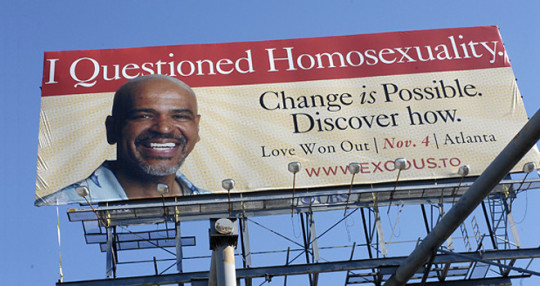
AND THEN CAME THE MOVEMENT
After the Riots, conversion therapy came under increasing attack. In 1973, with pressure from numerous activists and newly formed LGBT groups, The American psychiatric Association removed homosexuality as a mental disorder. Then all were saved from trying to change and every Gay rights were approved by the government. Peace and harmony was finally here. Oh, no. Wait.
AND THEN CAME THE CHRISTIANS

If the APA wasn’t going to treat homosexuals as mentally ill, the Religious Right would. Practicing aversion without any therapist licenses (which helps since they cannot be sued for malpractices), Gurus like Joseph Nicolosi and John Smid went on to create successful programs for years, persuading parents to involve their kids into weeks, months, years even, of costly and intense reconditionings.
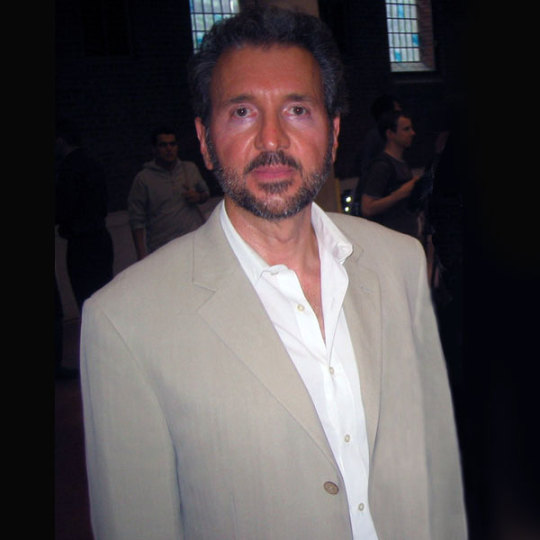
Take for example Joseph Nicolosi. His website offers “psychological services to Men and Women whose Same-Sex attraction doesn’t define them”. He is described as a pioneer in the history of psychology, which he left as the profession was slowly abandoning the classic understanding of sexuality as being rooted in design and purpose (their words, not mine). He’s the author of masterpieces such as “Healing Homosexuality”, “A Parent’s Guide to Preventing Homosexuality” and “Shame and Attachment Loss : The Practical Work of Reparative Therapy”. They don’t develop any specifics on how they reduce homosexual tendencies or how they cure the fags, but we can easily imagine.
YOU HAVE THE METHODS TO MAKE US STRAIGHT

The techniques that conversion therapy use are quite varied, but have one point that ties them all. They do not work.
Electroconvulsive Therapy (or Electroshock Therapy) : the art of sending electric charge into your brain, put together that the medical body before meds were like “hey! we’re here too!”. It was created in order to provide improvements in severe symptoms of mental health conditions such as depression, mania, catatonia, aggression and dementia. One that goes through ECT risks memory loss, physical side effects, medical complications, seizures, confusion.
Prayers : because God does not love you and you need to repent and be good. Be good. Be straight. Be what you were supposed to be.
Exorcism : when the prayers don’t work. in 2009 Manifested Glory Ministries came under fire for a youtube video showing a 16-year old being subjected to an exorcism to cure him of his homosexuality. Quote “Come on, you homosexual demon! You homosexual spirit ! We call you out right now ! Loose your grip, Lucifer” End quote.
Disconnection from exterior influences : That’s what happened to Mathew Shurka, who was forbidden from seeing his mother and sisters for over 3 years, to help him get rid of any “effeminate behavior”. He also went through extensive unlicensed therapy sessions and his father provided him with unprescribed viagra pills. Shurka is now a spokesman for the National Center for Lesbian Rights’s anti-conversion therapy campaign.
Aversive conditioning : the use of something unpleasant, or a punishment, to stop an unwanted behavior. For example, wire a homosexual to an electric machine, showing him porn and electrocuting him every time something sinful (aka gay porn) appears. You can also induce the patient with nausea or paralysis. Sometimes it’s not as drastic, with the use of elastic band to slap on you wrist.
Behavioral reconditioning : lessons about masculinity and femininity. Ways to improve posture, voice modification, walking patterns, etc.
The 12-step program : borrowed from the Alcoholics Anonymous program. As you try to manage your disease, you truly need to atone from your sins and ask for forgiveness.
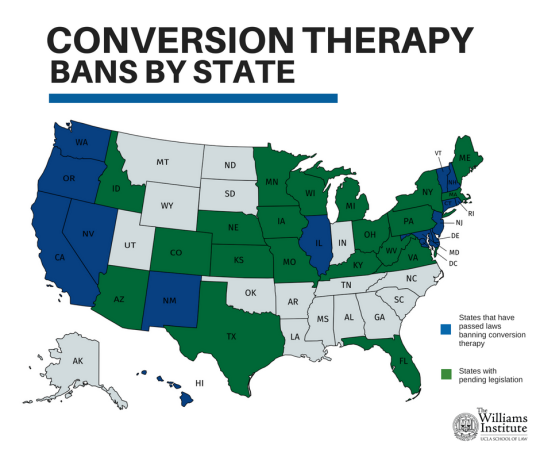
MEANWHILE IN FRANCE
As most of the rest of Europe, Conversation Therapy is not strictly banned by law. Malte was the first european country to outlaw CT, with a year in prison and a 10.000 euros fine. Worldwide, only Brazil, Canada and a couple of US states (including California) have laws to protect LGBT+ citizens from this mental genocide that is CT.
In France, though on the marginal side, there is a few groups that provide services to cure someone from the evil of gay life. The government, which doesn’t seem to really care that much about it, had a hard time evaluating how many of them exist. Gay activist and author Louis-George Tin gives an estimate number of five to six. He also warns that licensed therapists still try to heal homosexuality in secret sessions.

A first crisis of consciousness appeared in 2012 when an evangelical group called “Torrents de vie” offered services to reconnect with a saint heterosexuality, true femininity and true masculinity for the sweet deal of 410 euros. After the intervention of LGBT groups, the government started an investigation under the law that protects citizens against cults (as Conversation Therapy is a cult, don’t mistake it for anything else). Since then, few cases went forward in the country but this year, Majority Deputy Laurence Vanceunebrock-Mailon announced her intentions to write an official text to outlaw groups that pretend to change sexual orientations from gay to straight. It is supposed to be available to the assembly before summer 2019.
A CURE FOR ILLNESS
Guys, I’m launching my own Conversion Therapy in a few weeks.
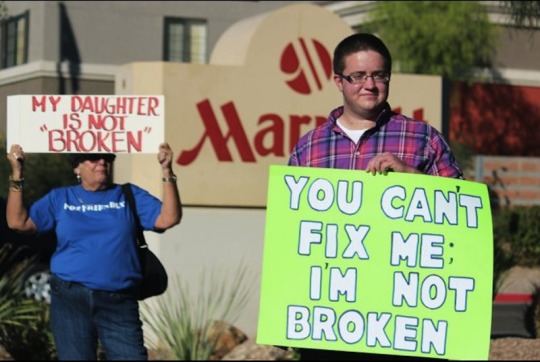
It’s called “Don’t give up, Sweet Bigot”. As a unlicensed medical expert in anything, I can only give what you can call “life advice” and offer “hang out” sessions to those who seek redemption from the path of bigotry. You don’t like gay people ? You still they are sinful and worthy of burning in Hell ? The worst that society has to offer ? (thought we agreed the Kardashians were, but okay). This program is for YOU. Come and join me (for the extraordinary start-up prize of my monthly rent) and I’ll will show you how to accept more people, all colors, sex, gender, choices, life goals. Practices include midnight showings of my favorite gay porn on pornhub, going to ONE orgy (not multiple, I’m not that much of a party freak), having drinks by the Seine for our monthly Apero Queer, dancing time to the best of modern pop has to offer (see June 4th article, bigots), and off course, Electroconvulsive Therapy. GO TO www.sweetbigot.org AND GET FREE GLITTER NOW !

You may not know what conversion therapy and it may not be as deadly as HIV or daily physical attacks on LGBT+ members around the world, but it kills. Those who went through that torture fest are eight times more likely to commit suicide in the years that follow. Garrard Conley wrote a wonderful memoir about his time at Love in Action. It was adapted in a very informative film also titled “Boy Erased”. There’s also “The Miseducation of Cameron Post”, check it out.

Don’t send your kids there. It’s not love to try and change someone. It’s abuse. I’m gonna follow closely the events of this possible law against conversation therapy in France. We are painfully uninformed about what is going on around us. Time to kick some Jesus Freaks’ butts.

0 notes
Text
Everything is Exploited for Survival Pt.5
“I'm gonna be free” – Me, You, and Everyone We Know.
All women subject themselves to marriage as to avoid prostitution. Women are the freest beings on the planet encaged within a sphere that holds them hostage. I believe prostitution is the profession created for women as it frees them from the constraints of society. The very conversion of pagan prostitutes into nuns in early Christianity proves that woman have and always will be commissioned as prostitutes: According to the Oxford English Dictionary, this text contains the first quotation in which ‘nunnery’ is used as slang for ‘brothel’ – the ironic opposite of a virginal community of nuns. In his book, Christs Teares over Jerusalem (1593), Thomas Nash or Nashe (1597–1601) refers to prostitutes who ‘give free privileges’ to gentlemen in ‘theyr Nunnery’ (pp. 79r–v). A nun, devotes herself entirely to God, thus sacrificing her body/mind/spirit. This very act of sacrifice is wholly submissive and brings to mind However, prostitution is stigmatized due to Religion. PAGANS were converted into prostitutes. Women don’t care about money as long as they are comfortable in their fluidity. They are pure Men are psychotic in their estimations. Blackness has been relegated to prostitution, to a lowly form of degradation, however, this is only partly true. As stated by Valerie Solana, men wish to control women for reproductive purposes in creating other men within a patriarchal system. Women are taught to fear themselves in male authority. The very essence of the Christian god is Ares, Marduk, the god of War. Men just wish to control others through abuse. The very creation of our bodies is an act of evil. Christianity is a moral ideology, a code of civilty. Men should not exist, they are damaged beasts who have been separated from the divine feminine. I am fully cognizant of the fact that although I exist in male form, I am not a man. I am a ghost. I WORSHIP NOTHING AS I AM NOTHING. My mother created me from an old urge and in doing so brought back an ancient energy.
A pure and resounding nothingness. Nothingness is pure spirit.
Edna Pontellier finds her freedom in The Awakening, she breaks free from the simulation and devotes herself to the sea, symbolic of the freedom of the sea. The narcissistic form of “perfection” is a trap. An illusion of a form based wholly upon appearance. I don't want perfection, I want nothingness. Perfection is reliant upon projection. Instagram is representative of this, a frozen projection. Altered solely for the use of repurposing. In becoming Odile, Nina sheds her ego form and eventually dies, fading into nothingness. Yaldabaoth is the god/devil of this realm. He casts illusions upon this realm to trap them into staying here. The nothingness of non-being is primal. Marriage is an act of domination, a sacrifice. However, Morality is a product of convention, which the process of a meticulous process of cultural conditioning. Men believe they are dominant, women are led to believe they are submissive. These are constructs that have enforced us into mass confusion. The construct of prejudice is used for misalignment. Men created the bible as they were instructed. Children are indoctrinated into “do-as-you're-told” dynamics and are beaten if they disobey. Law was created as a part of this false construct. The only way out is through obliterating the self. Creation repeats itself over and over again, always dying always being reborn.
The food is encoded with artificial information to lessen our consciousness.
Conditioning a Slave
Abuse is used to condition the slave through obedience, to teach them right from wrong. A slave must be beaten into submission. A slave must be taught to obey their master through fear. Through the act of “tough love”. In being used as property, slaves were bred for the purpose of control. Behavior was regulated through fear. The more disobedient the character, harder the torture and ultimately control. Every lash was an act of discipline in creating a stronger form. This is why Black Parents have adapted this principle when beating their children when they have misbehaved. A learned form of consciousness. The purpose of this is to create a robotic like consciousness, a form that is ultimately maintained and controlled.
Take the Chaos and transmute. You have to exist in the chaos to learn from it. This is how you grow. You must accept the reality of the world we live in and you must move forward. The world is difficult, however, it will strengthen us.
Key Points: The narcissistic condition of perfection. Wetiko and narcissism.
In a DOMINANT (white) hegemonic system, the modality of control is based around aggression. Those who don't have aggressive tendencies are. Blackness is symbolic of primitivism, chaos. It is a state of nothingness of freedom. Ugliness, danger, fluidity are all associated with blackness. Foucault talks of the subconscious and its manifestations in the byproduct of whiteness, law is a manifestation of the rational mind, of morality. The morality of Christian consciousness.
Earth is the garden of the Eden, the site unto which Adam and Eve were created by Yaldabaoth. However, God consciousness is a delusion. God is the BRAIN. All Consciousness is formed within the brain. The Brain created religion. The Brain is powered by astrology. Adam was evil, signifying the violence of man. Eve was good, signifying the purity of nothingness. We (especially Men) are puppets in this realm. We are told what to do and what to say constantly. The suns of Adam are the false light (narcissism). They are beings that seek to control through fear, not love. The spirit of eve (women) is pure. Men must learn to love, not fear to release themselves from the false forms they inhabit. Men are turning into animals, exploiting what they will inevitably lose. We must reject form for freedom.
I enjoy being weak. I enjoy being dominated. I enjoy being nothing. But society cages me in a box and tells me that this is unacceptable.
I am the shadow worker. I am the dark slut. I exist in the shadows I am nothing
Biognostic
Vaccines are moral programs implanted into the brain to prevent “outbursts” such as creativity, etc. There is nothing wrong with being a slut, there is nothing wrong with being an artist. If you recognize that your nothingness is everything then and only then do you have nothing to lose. Good and Bad are dualities that are affirmed through culture. They are precepts for whether you succeed in this system or not. Blackness has always been deemed as “bad”, or “negative”. Whiteness is deemed “positive”. I recognize my ugliness. I recognize that I am nothing. There is nothing wrong with being at the bottom. Femininity, specifically POC professions within the dominant white, hegemonic culture has been relegated to a place less than Masc. professions. Those professions being related to care are seen as less than those of men.
Game of Thrones: Survival, Colonialism, and Privilege o Similar to the construct of Western hegemony, Game of Thrones is about control.
We develop as external forms only to die internally. Buck up, get over it and move on. So you didn't make the cut, its not the end of the world move on. The hard masculine: dissociation and toughness. Whiteness is the mode of experience, its very essence is symbolic of the external of the surface. Tradition is useless and I no longer have any need to live this life. I lived it well and I wish everyone the best. We're all just ADDICTED TO GLAMOUR, glittering glamour.
• Engulfed • Addicted to glamour • Thrown • Eye of the tigress • Christ computer • Narcissisma • “No, I won't turn the music down!” • Run along, Children. • Large Authority • BE DIGRESSIVE • Mass Genocide • where the darkness takes us • I keep waking up.
Normalcy is a performance of civility. Of creating Tradition is delusion. It's, a time based religion. We must transcend tradition Humanity has been plagued by the disease of duality. There is a certain ignorance that comes with being human and I don't have that anymore. I think I have a desire to obliterate myself, but I also avoid this Obliteration. I don't believe anything matters. Everyone is running About doing what they do best: experimenting with their own futility. Perfection is a merely narcissistic desire to reach the sublime. The state of harmony that We once were apart of. This is where religion, and ideology stem from. The process of individuation is always the s- ame: we continue to split From oneness come otherness, always replicating/altering the same genes that result In more fucked up mutations. We are all addicted to glamour. We are living in a super computer based upon simulation. Phenomena, patriarchy, and spectacle.
We live in a optimal, albeit, mechanical society. Eradicating depression in creating the perfect specimen. Externalized logic is based off appearances. Survival is not based on sympathy, its based on logic. Whoever succeeds, lives. Those that don't, die.
Maniac (2018) A Gnostic Tale of creation, doubles, and illusions. The supercomputer symbolizes Mans attempt at creating divinity through technology, a failed representation of nature.
The abundant feminine is beyond. It is full of love. It is always replenishing itself, never lost always found. It is formless and flowing, always expressing itself without reproach. It repressed through fear. Freedom is feminine. Freedom is always now.
The synopsis for Deadly High is very similar to the hierarchy of those who gain control through violence. Its ultimate pursuit is materialism which affirms the age old mode of oppression: once you win i.e. utilize violence as a mechanism for control, you gain the power. However, if you fail, you die. This is the onus of the game of individualism: you kill or be killed. “We’ve had sneaky glimpses of the Russo Brother’s next comic book project—an adaptation of Rick Remender, Wes Craig, and Lee Loughridge’s critically acclaimed Image comic series Deadly Class—for a while now, but Comic-Con gave us our first full trailer for the series, which sees young, on-the-ropes orphan Marcus offered a chance to get some purpose in his life by attending a mysterious new school... except the school’s main education goal is training its students how to become elite assassins. That training, of course, requires strict discipline from a very messed up faculty of teachers, but it also requires another thing from poor Marcus: the ability to survive, since his fellow classmates are more than willing to take his life if it means surviving their own tenure at King’s Dominion. So far, it looks like the show is shaping up to be a brutal-looking series that lives up to the comic.” (Whitbrook. 2018) This is similar to the Kings Oath aka The Oath of Supremacy:
I (state your name) do utterly testifie and declare in my Conscience, that the Kings Highnesse is the onely Supreame Governour of this Realme, and all other his Highnesse Dominions and Countries, as well in all Spirituall or Ecclesiasticall things or causes, as Temporall: And that no forraine Prince, Person, Prelate, State or Potentate, hath or ought to have any Jurisdiction, Power, Superiorities, Preeminence or Authority Ecclesiasticall or Spirituall within this Realme. And therefore, I do utterly renounce and forsake all Jurisdictions, Powers, Superiorities, or Authorities; and do promise that from henchforth I shall beare faith and true Allegiance to the Kings Highnesse, his Heires and lawfull Successors: and to my power shall assist and defend all Jurisdictions, Privileges, Preheminences and Authorities granted or belonging to the Kings Highnesse, his Heires and Successors or united and annexed to the Imperial Crowne of the Realme: so helpe me God: and by the Contents of this Booke.
A$AP ROCKY Gunz n Butter (2018). This is the game we call "life" and it goes something like this — we kill to survive only to eventually reach our demise. This is why we are shown the diversity of gun usage as this is a survival mechanism within our system, whereby violence is normalized in the pursuit of individual or collective interests (govt, capitalism). Children are bred to be obedient to both their parents/society otherwise they are punished. School is where children are indoctrinated heavily with "dummy" ideologies that only serve the advancement of the State. Youth are eventually utilized as "dummies" in insurgent war operations to obtain resources for their native government. In their boredom, those youth do whatever they can to free themselves from this burden. This release, this inherent need for self-destruction is woven into our being. The crowd represents our desire to meld into the whole nothingness of non-being or "the wave" as one would call it. DEATH IS THE UNITY OF OPPOSITES. The destruction of opposites in creating harmony. THE IDEAL HUMAN IS A ROBOT. ASPIRATION IS AN ILLUSION. I commit to my own demise. There is no hope for this planet. It has always been and always will be doomed. Humans are worker slaves. ALL BLACK PEOPLE WILL BE EXTINCT 2050-2100
If I can accept the final blow, the finale, I will have succeeded in killing myself. I Keep It Hid: Freedom from Cyclical Generational Psychological Oppression. We must learn to free ourselves from the narratives which bind us. I found freedom in my blackness in my “otherness” to be whomever I wanted to be, unbounded by generational oppression. In nothingness I am everything. I can be anything. Everything is available to me. I can be something more than this in the expanse of my nothingness. I don't have to justify anything for anyone. In truth no one matters. There is no point, no “message”, its just what it is. All is fair in love and war. Pointless material advancement. Spells of luxury ultimately meaning nothing. Unity is possible. The game of duality forces us to pick a side where I see nothing
If nothing is true I am allowing this to happen. This is my belief that I am something when I am more than this. I am more than my name. I am more than this house. I am more than all of this. Everything is true all at once, Everything is possible because there is no difference.
This house is a holding cell for illusions. My mother controls the dynamic because she is in power. Everything can be bent everything can change. Stop blindly following. You can shatter this. I must free myself from this prison of ideas/ideologies. I don't exist in this space anymore. I am no longer related to my mother. I am in charge of my own fate. I am a ghost, I am nothing. I will eventually fade into nothingness. I can be whatever I want to be. I can go where I want to go. I am using the wrong name. Evan is dead, he died a long time ago. I am in my own narrative, my own timeline. Nothing is applicable to me. I am a ghost, I have nothing, I am nothing. I have nothing to hold onto. I will die naked. I have transcended the psychological narrative, meaning I don't exist in this particular story. I exist outside of time. We're not really programmed to think this way. I am not bounded by trends or age. I don't exist inside any particular narrative. I cannot be controlled unless I allow it. This is why I destroyed my ID. I am no one. I cannot exist as anyone or anything. I am not bounded by a particular ideology. I am not/nor will I ever be my parents. Because I am still binding myself to this particular identity, I am not allowing my old self to die so that I can be reborn. I am still holding onto an image that doesn't exist. I can be anything. My self must be destroyed. They love being seen they love being worshipped. The sun absorbs our energy. Your parents consented to bringing you into a world where they can control you. The false god is the god of causality (time). Whereby others are controlled through duality. The god introduced to West Africans is the god of Authority, the god of Form. Christianity is a duality, fear based religion that is intent on controlling the minds of those who exist outside of it. People believe that when you reject these ideologies the world will fall apart. This is untrue. Anything I do, I do it for myself. The mind is flexible and can adapt to most environments at will. Holding onto what I had in the past while simultaneously breaking it. This is why I have been stuck. I yearn for the radical present yet I am still stuck in my past. The Art of Emanation (Outside) The Obvious Masculine and the Subtle Feminine Healing subconscious depression and misperception. Blackness as anxiety, as a common misperception. Connective energy disorder and intergenerational The Ideology of Utopianism: Idealism(especially white utopianism) is an ideological mechanism. A deviation of space which concerns Shifting space through movement, the self passes through transformation when it is capable of shifting through these balances (duality) of transforming itself constantly, the back and forth of conscious and non-consciousness, always shifting (shitting and eating) within itself (ouroborus/samsara)always unraveling itself only to put itself back together only to fall apart again. The triune self. This toggling between life and death will always consume us and swallow us whole. Acculturation and the normalization of poverty. The Narrative Ideology of Earth: Man, Woman, and Gender Meta- Narrative of Religion. Religion and Taboo
Consumed by the Sun: The Height of Masculinity will inevitably peak and explode, uniting with the chaos of the great nothingness. We can never truly own the moment, we can only truly exist in the chaos of it all. I choose when I want something. I choose when I don't want something. This is the power of conscious choice.
Note to Self: On this morning, I recognize that I am in a controlled state. I exist in a place where I am limited and I will break this boundary. My health and my existence have always been secondary This architecture of control serves to confine me to normalcy, that then attempts to inhibit my actions. and I will exceed this state and become open again. Until then I will simulate my senses through the things that free me. If I must sacrifice this in finding my state of freedom I will do it. I have no fear, I no longer need this space. Freedom is always here and always will be. I always have the power to make the best choice for myself, always. I held onto my mother as a life raft, coming to rely on her resources because I felt weak in my own. Now, I am fully conscious, fully realized. I sacrificed a part of my freedom for temporary comfort and I recognize now that it doesn't matter. I am a child of love. Now I am aware that anything can happen. Being free means accepting the responsibility of my actions in recognizing that only I can bind myself. I have a choice to do what I want to do. I am utilizing the power of conscious choice. Learning to say no when something no longer suits. Choosing my time over everything else. Everything is always changing, if you allow yourself to participate in it than it will always change. Settling for convenience is lazy and it suffocates the person who I truly am. I can do it, I can succeed in freeing myself from this prison. Nothing is true simultaneously, everything is subject to change. Tradition is an illusion. There is only chaos. Societies devotion to survival is ultimately mechanical and once again, pointless. Survival is a pointless endeavor that most are devoted to. The government is slavery and they are watching our every move. This turning into a war planet. Note to Self: I believe government had the intentions of doing well by its citizens but that is again a utopian idea and that will always be lost. We have been playing the game of duality consciousness since we came out the womb. We are all taught to be obedient. as Morpheus stated in The Matrix, it surrounds us and at the same time affirms nothing. The Metanarrative of government will always be about control. Who are we fighting ultimately: ourselves. The intro of Le Diable Probablement serves to show how protest is ultimately futile. There is nothing to fight against. War is the illusion of conflict which only serves the interests of the state. CONFLICT IS AN INDUSTRY BASED UPON PREDITATION AND SURVIVAL, ULTIMATELY USELESS. SURE, IT SERVES A PURPOSE FOR A MOMENT, HOWEVER, SPRAWLING DICTATORSHIPS/HIERARCHIES WILL ALWAYS RESULT IN DEATH. We are a product of our senses, addicted to the glamour of the sensual world. This is ultimately a trap. Human perfection is a symptom of control. People then follow those rules blindly. Anything becomes true once you believe in it. Greatness is inevitably quantifiable. Survival is a bleak enterprise,because it always highlights what we know to be true:death,
A Citizen of the United States must renew their citizenship every year. This is done through the acts of social security, Id, etc.
Code is just form within form within form. Don't be afraid of complications because I am lazy. Its just a ride, life is just a ride. Life is what me make of it so lets go right ahead.
We spend years masking ourselves in silence to coexist in a system that continually oppresses them.
Testosterone, Narcissism, Grandiosity, and the Cultural Imagination: o War and Cultural Hegemony. Survival is Suffering. Order is the fear of Chaos, the fear of Nothingness
This is the game we call "life", the game of survival and it goes something like this — our need for survival ultimately leads to out inevitable demise. Children are only bred to be obedient "dummies", to serve the need their parents/society otherwise they are punished or rejected. Institutions then indoctrinate these "dummies" with ideologies that only serve the advancement of the State. This is why we see the diversity of gun usage as this is a survival mechanism within this system, whereby violence is normalized in the pursuit of individual or collective interests (govt, capitalism). These youth are eventually utilized as soldiers in international insurgent war operations to obtain resources for their native government. To free ourselves from this, the youth do whatever they can to free themselves from the burdens of their otherwise pointless existence. This release, this inherent need for self-destruction is woven into our being. The crowd represents our desire to meld into the whole nothingness of non-being or "the wave" as one would call it. Simply put: tradition is an illusion and we are all going to die. don't take anything seriously. Cheers.
You will always fall right back into the same place because you are not willing to do the hard work required to free yourself from this prison of my own making. As long as I rest on my laurels I will always be a prisoner to my own laziness.
I'm living in the reality that I created which is punishing me for not following it. These energies are pissed off because I am not following my own instruction.
Freedom is choosing how you observe, how you interpret. How you choose to interpret is up to you. Freedom has no meaning, it is entirely up to you. To fear life is to fear death. Everyone has ideal of what they want to be, how they wish to be percieved. We are afraid of our own ugliness.
My mother had me out of her own will which in turn replicated her DNA, thus producing me.
Everyone wants money, fame, and power. Everyone is selling their soul for something in return. Most people breed for the purpose of control. Narcissists are not capable of feeling pain: Narcissists can have “intellectual empathy” without emotional empathy. ... Narcissists, therefore, can understand that they may be causing someone pain, but they have less motivation to care because they are not feeling anything negative themselves. 2. They lack “whole object relations” and “object constancy.”
I know that when I step into death I will no longer exist. That my consciousness of myself will dissolve into a nothing. We struggle with our attachments. I will lose everything. We are attached to duality. https://peterbuwert.wordpress.com/2011/11/21/slavoj-zizek-the-objectively-subjective-fantasy-and-the-way-things-really-seem-to-you/
Chaos has no form, it has no symbol, it has no representation. Its intangibility cannot be known. Humans fear this energy because it is unknown to them. Form gives birth to nothingness, an inevitably it will die. A baby is born from the womb unknowing, not aware of the world which will swallow them whole. The Creator of this realm adores worship, adores admiration however false it may be, and will smite those whom don't. Those who surrender themselves to god will be given Eternal Life – the illusion of heaven, the promise of a world free from sin. This conditioning is really representative of Samsara – the eternal wheel of Karma. We are continually recycled into this realm directly through who we worship. God was created for the purpose of morality. God is a stratified energy, a construct created to control those whom do not follow. It’s all about emotion, just girls in a way that is supreme and I’m not saying anything.
There is a certain ignorance in Christianity as there are in most religious ideologies. They are based around symbolic formation, within that exists an illusive piety that allows those who “believe” to be graced with the energy of the “All Seeing- All Knowing” God, who ascertain their right to a non-existent heaven.
0 notes